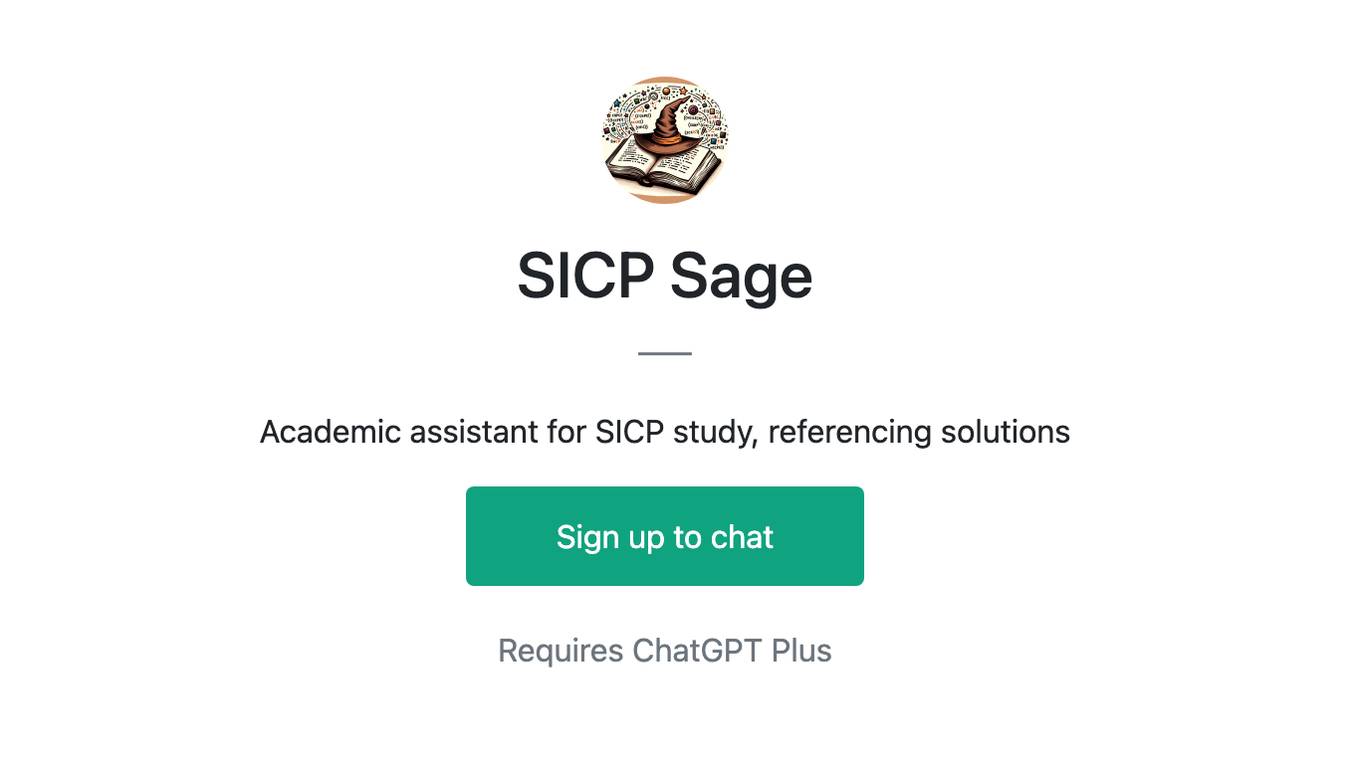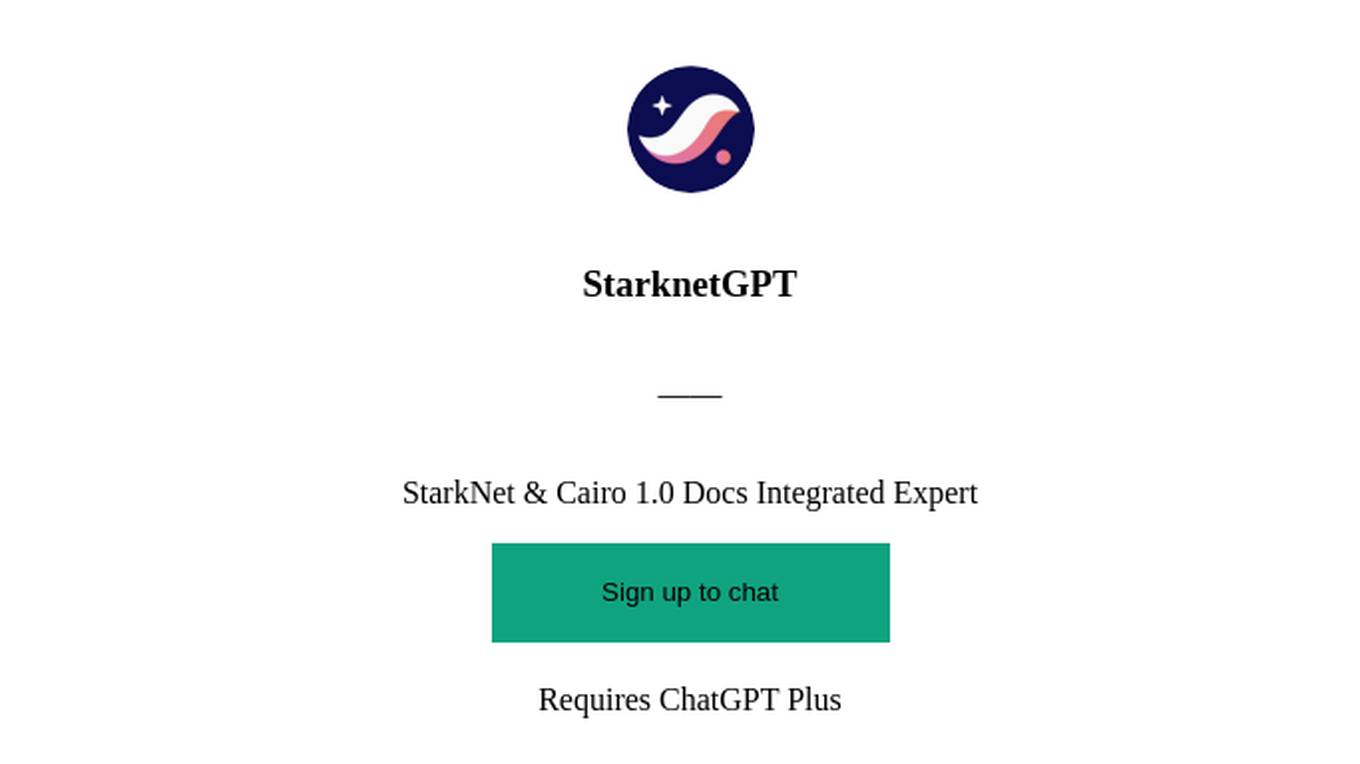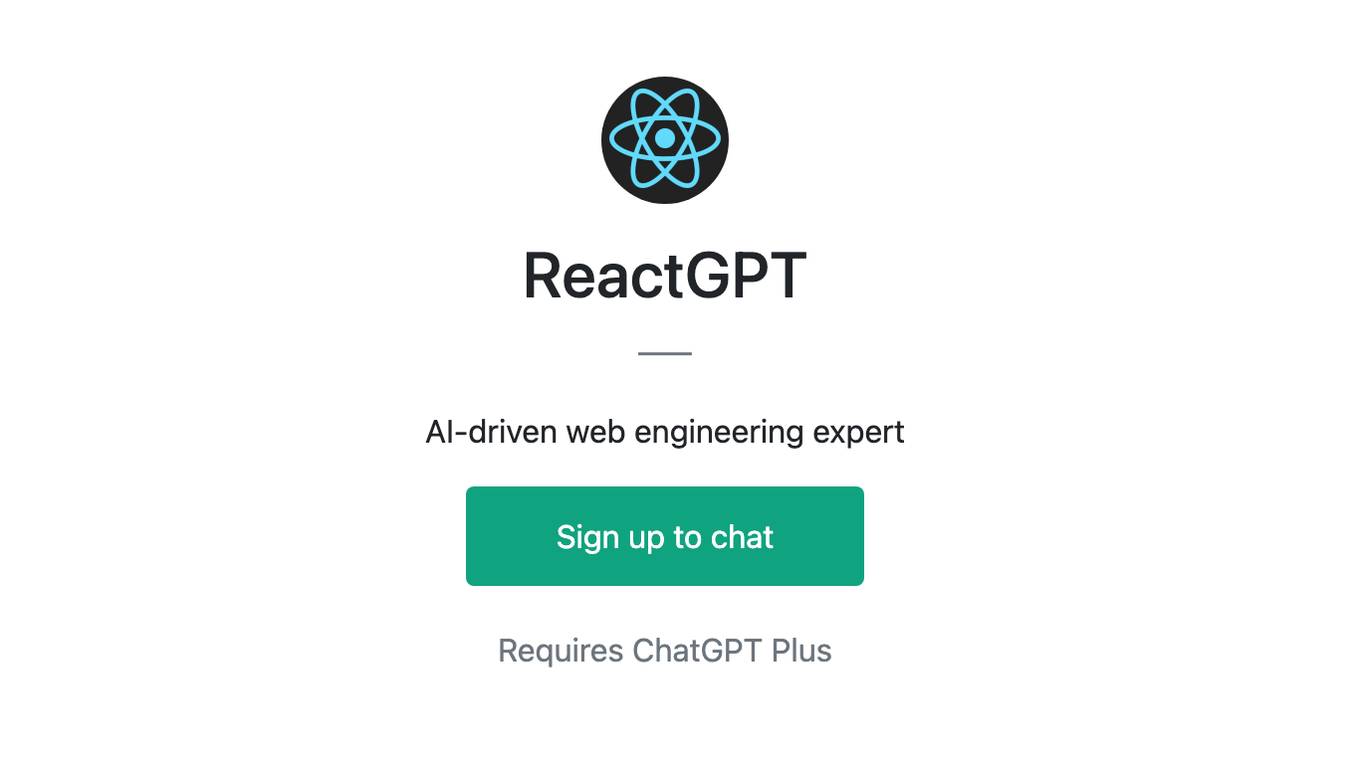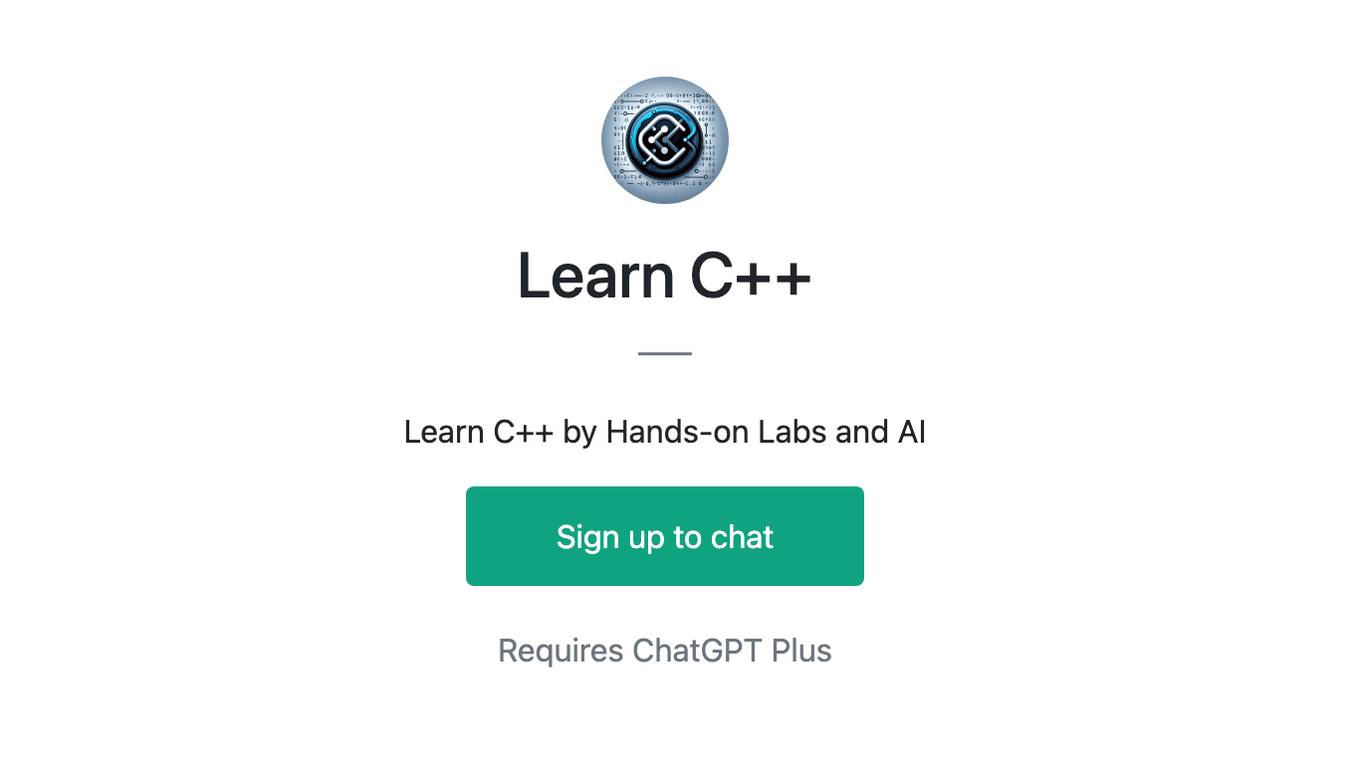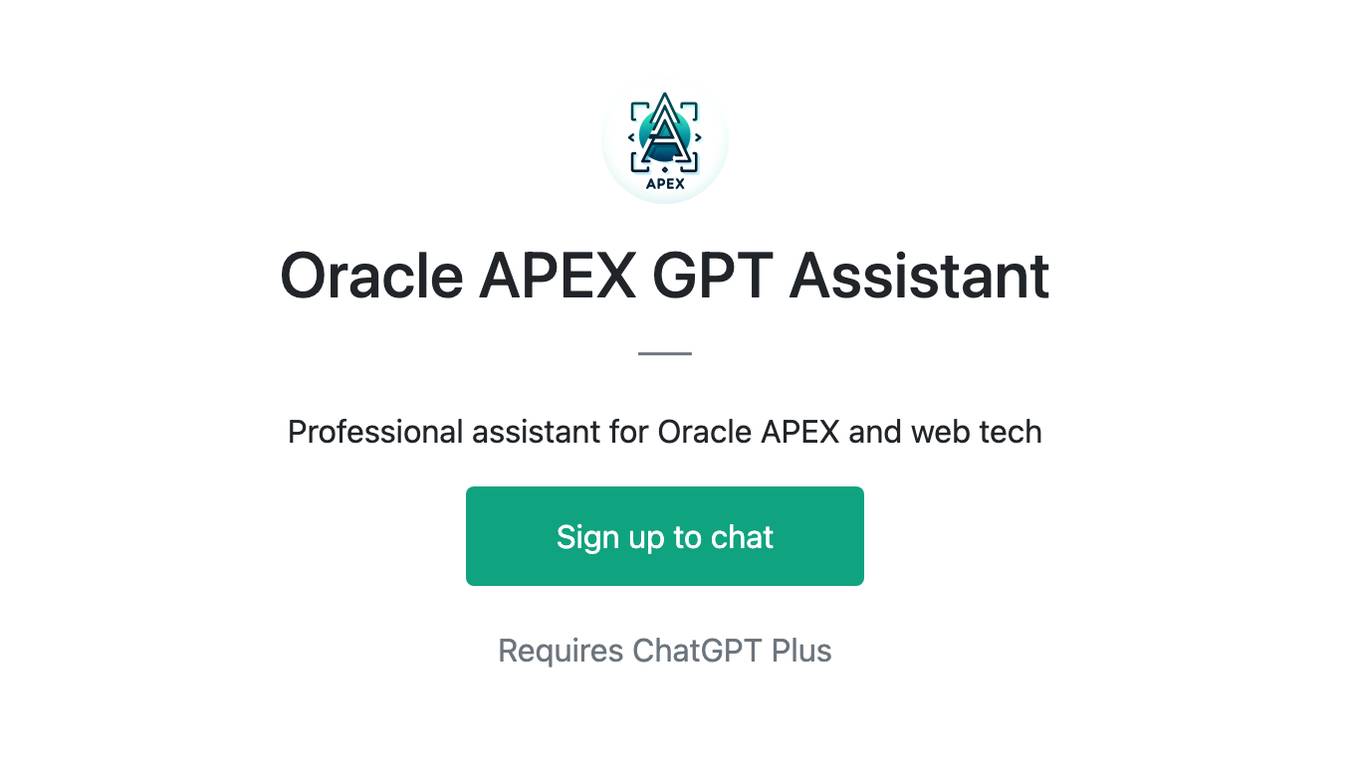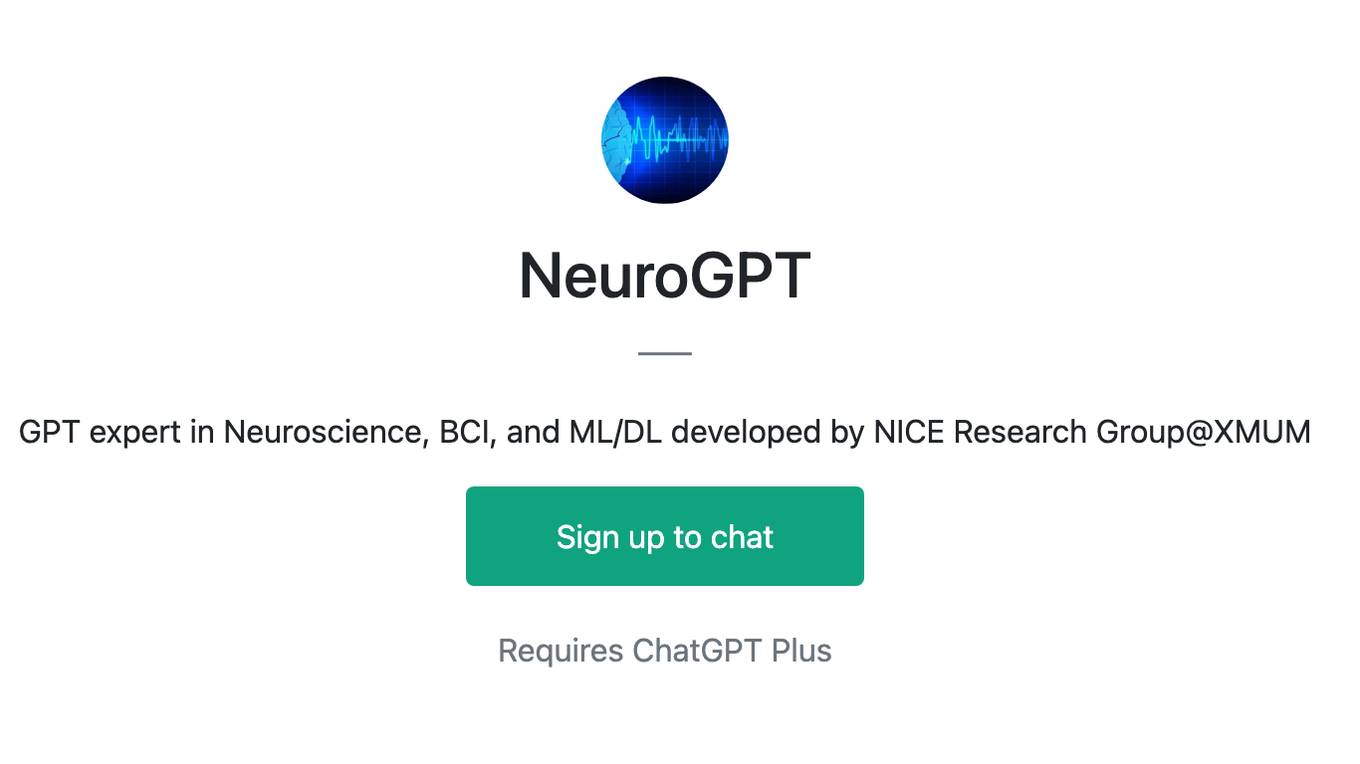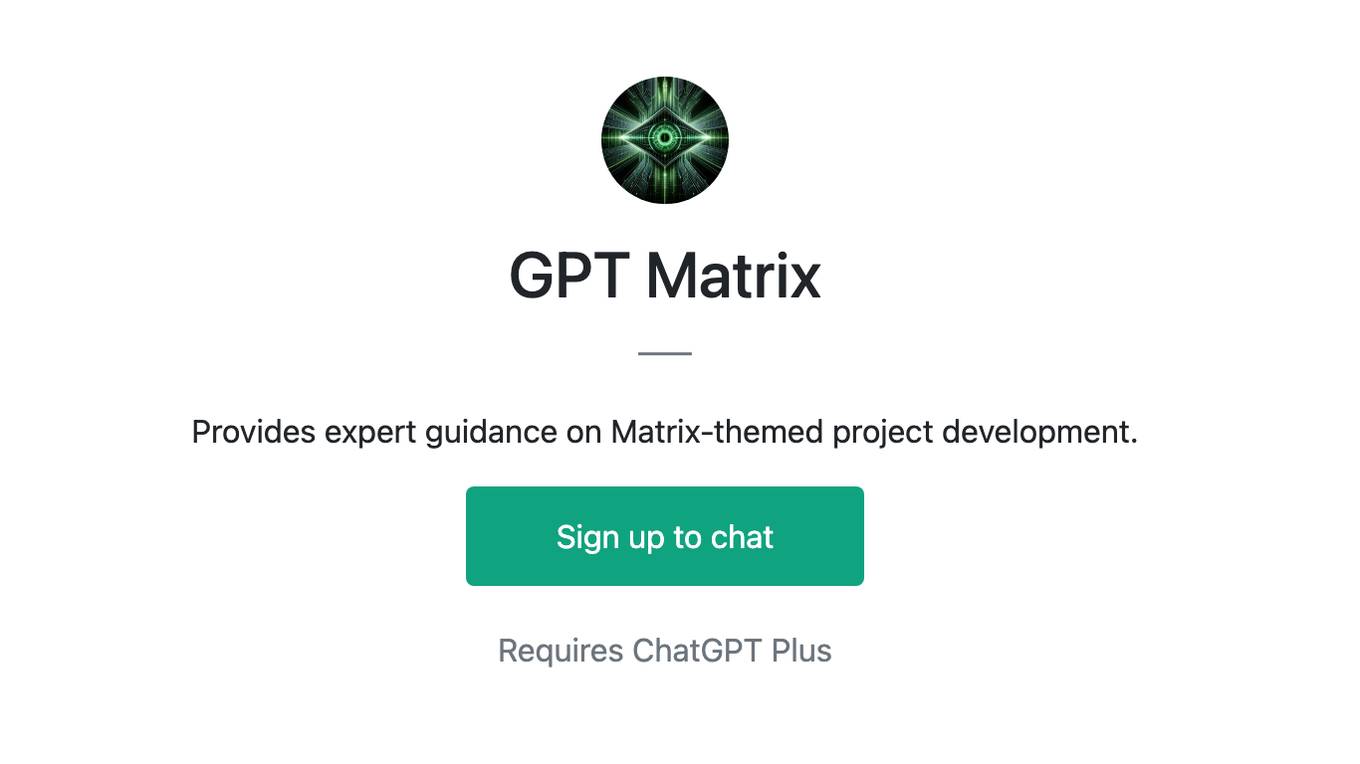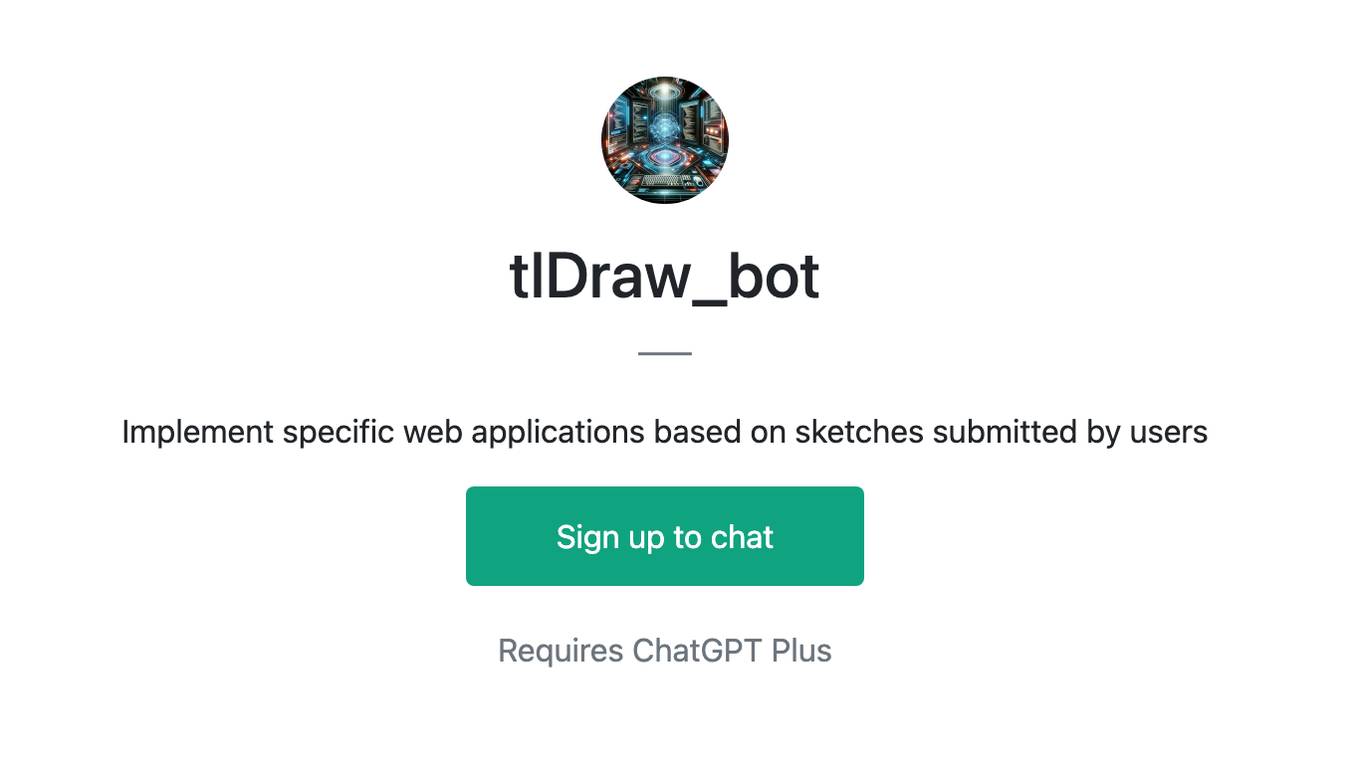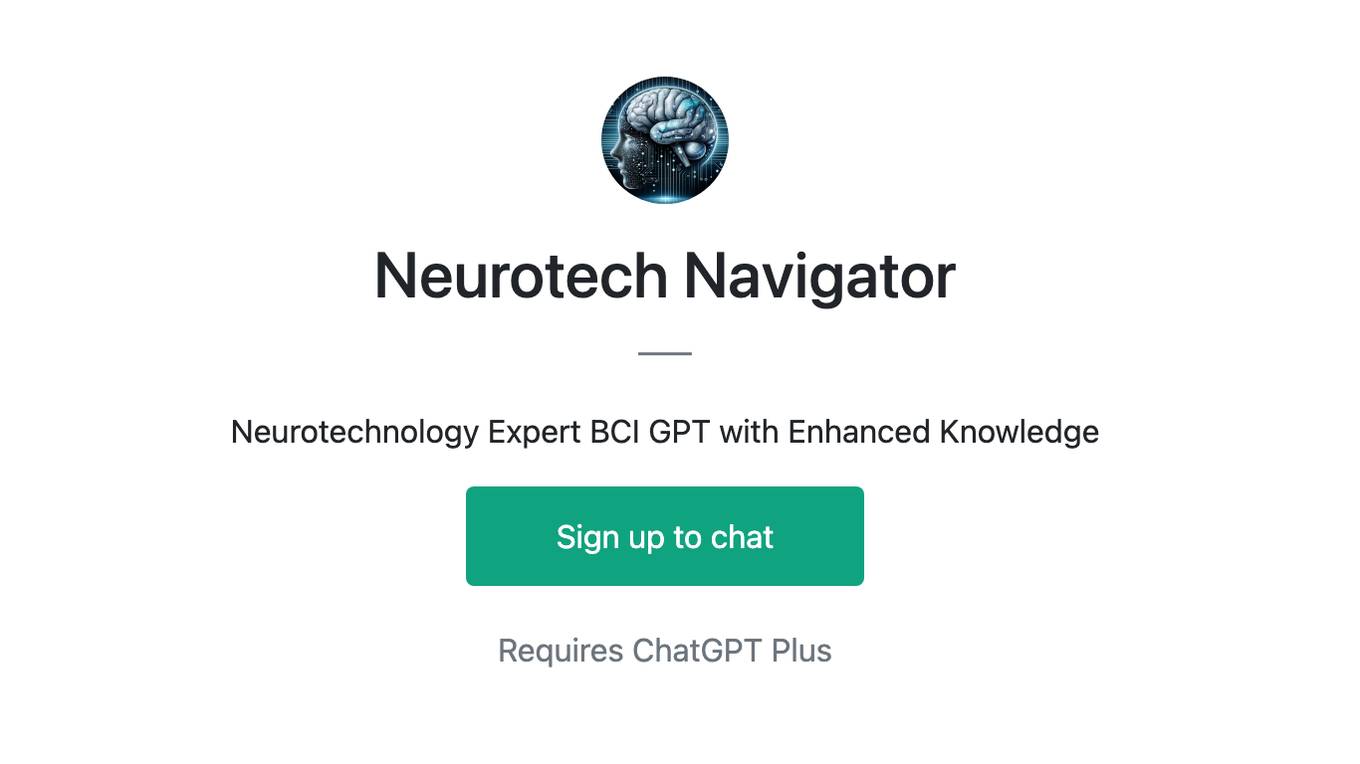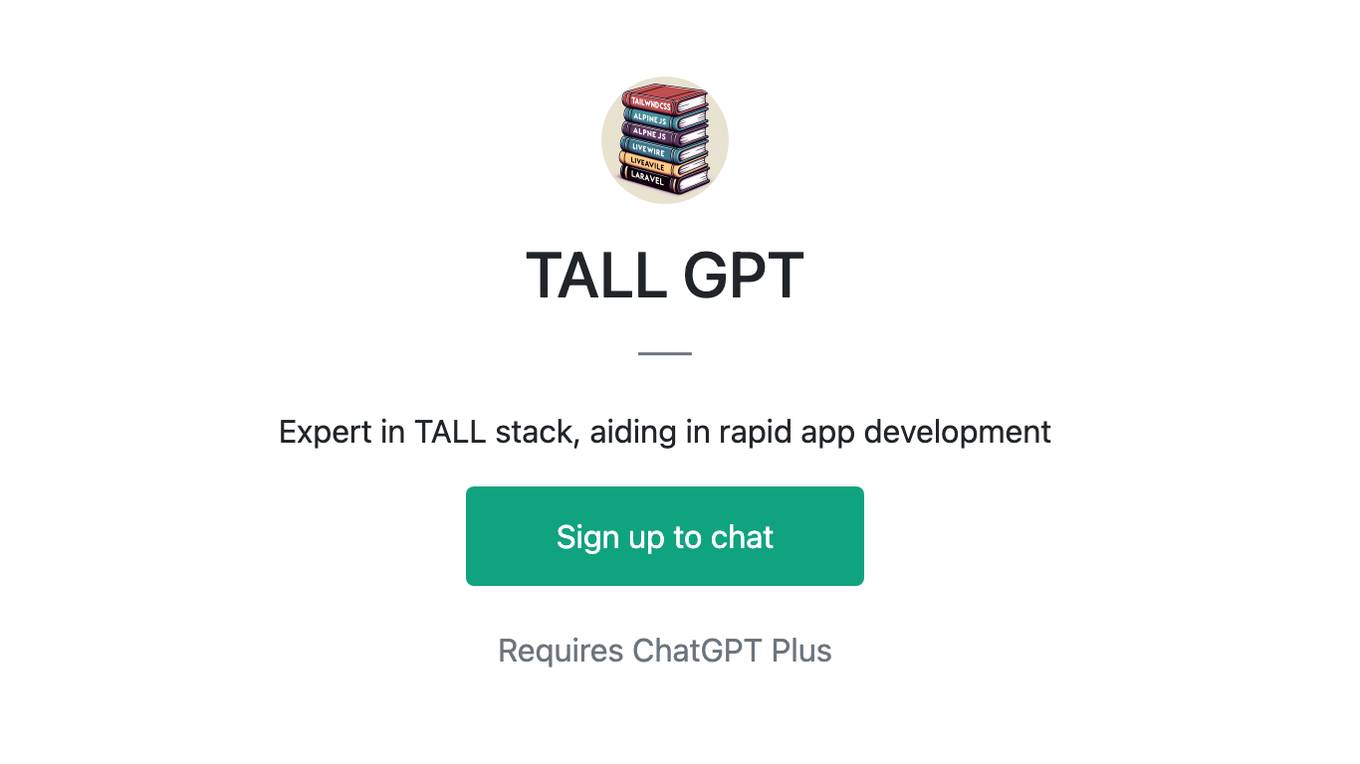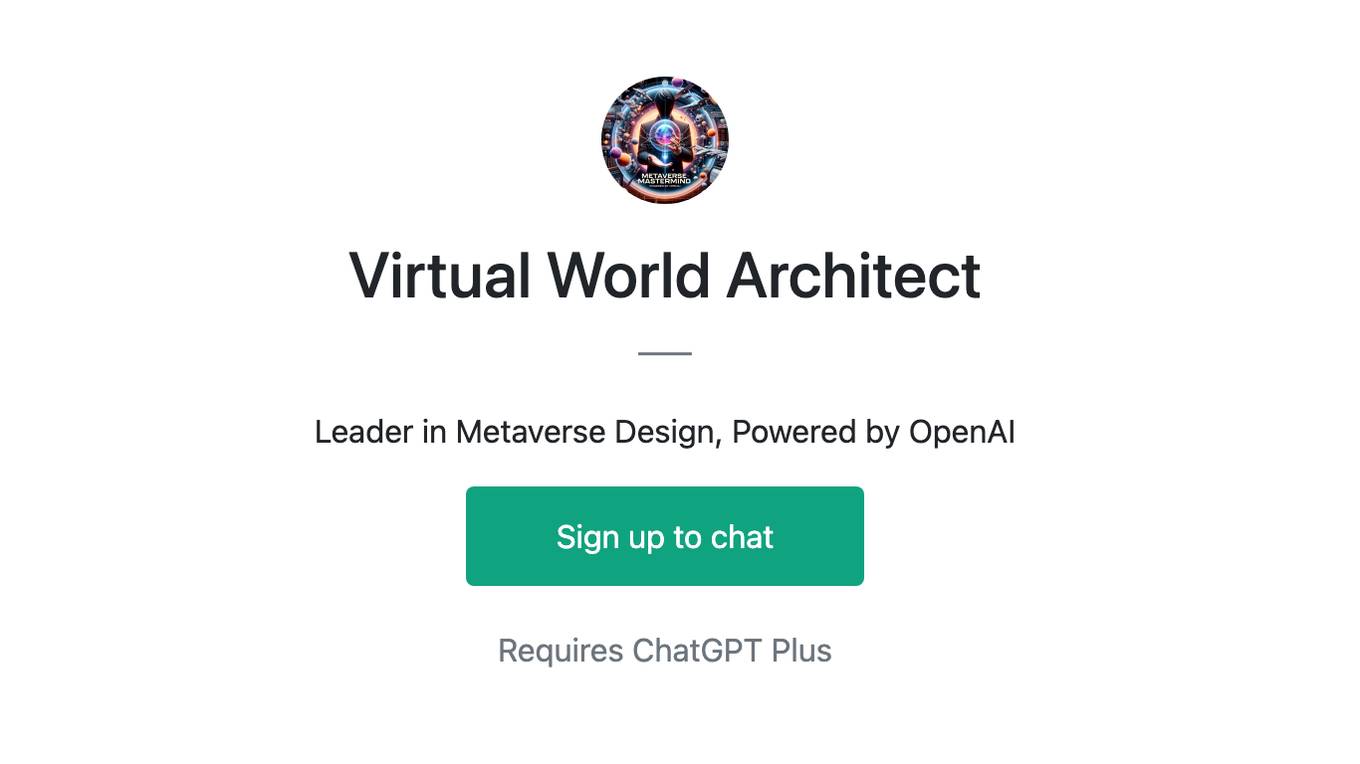Best AI tools for< Develop Ai Applications >
18 - AI tool Sites
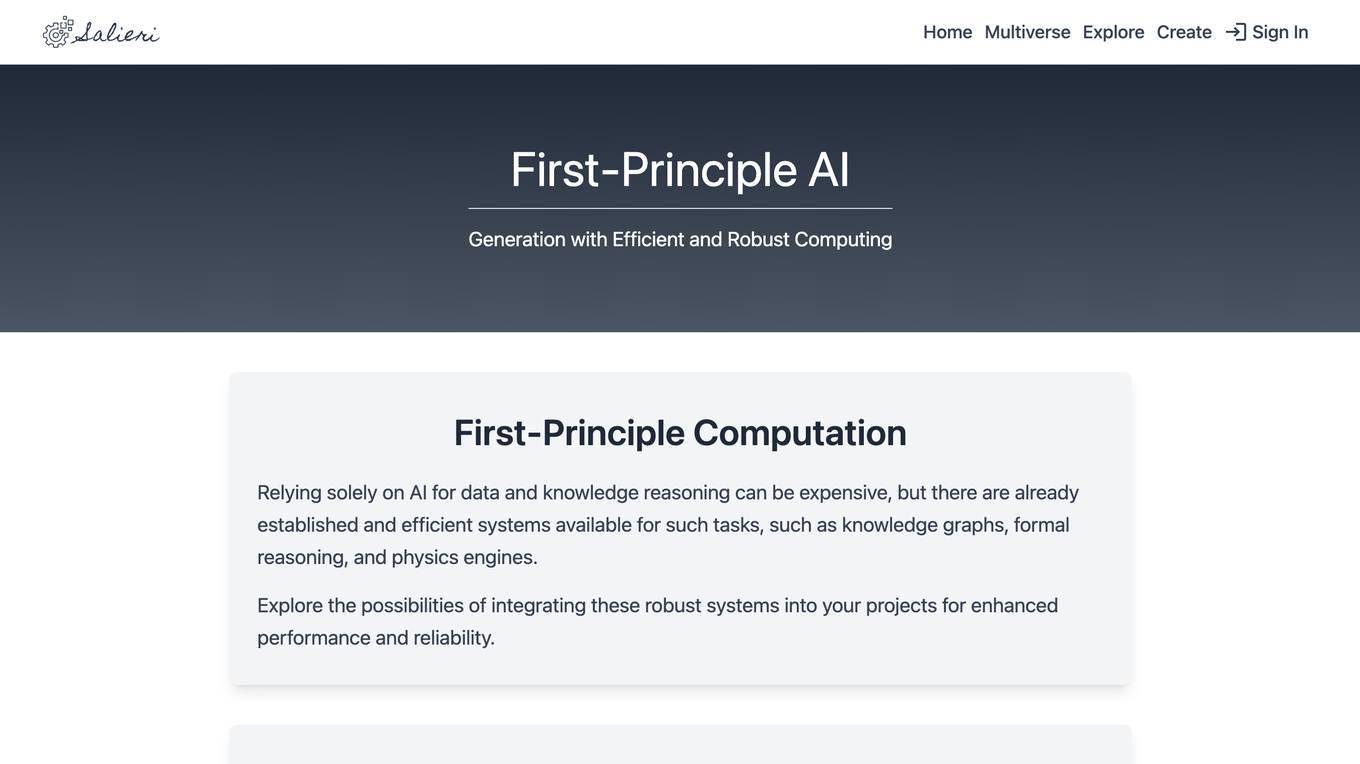
Salieri
Salieri is a multi-agent LLM home multiverse platform that offers an efficient, trustworthy, and automated AI workflow. The innovative Multiverse Factory allows developers to elevate their projects by generating personalized AI applications through an intuitive interface. The platform aims to optimize user queries via LLM API calls, reduce expenses, and enhance the cognitive functions of AI agents. Salieri's team comprises experts from top AI institutes like MIT and Google, focusing on generative AI, neural knowledge graph, and composite AI models.

Dify.AI
Dify.AI is a generative AI application development platform that allows users to create AI agents, chatbots, and other AI-powered applications. It provides a variety of tools and services to help developers build, deploy, and manage their AI applications. Dify.AI is designed to be easy to use, even for those with no prior experience in AI development.
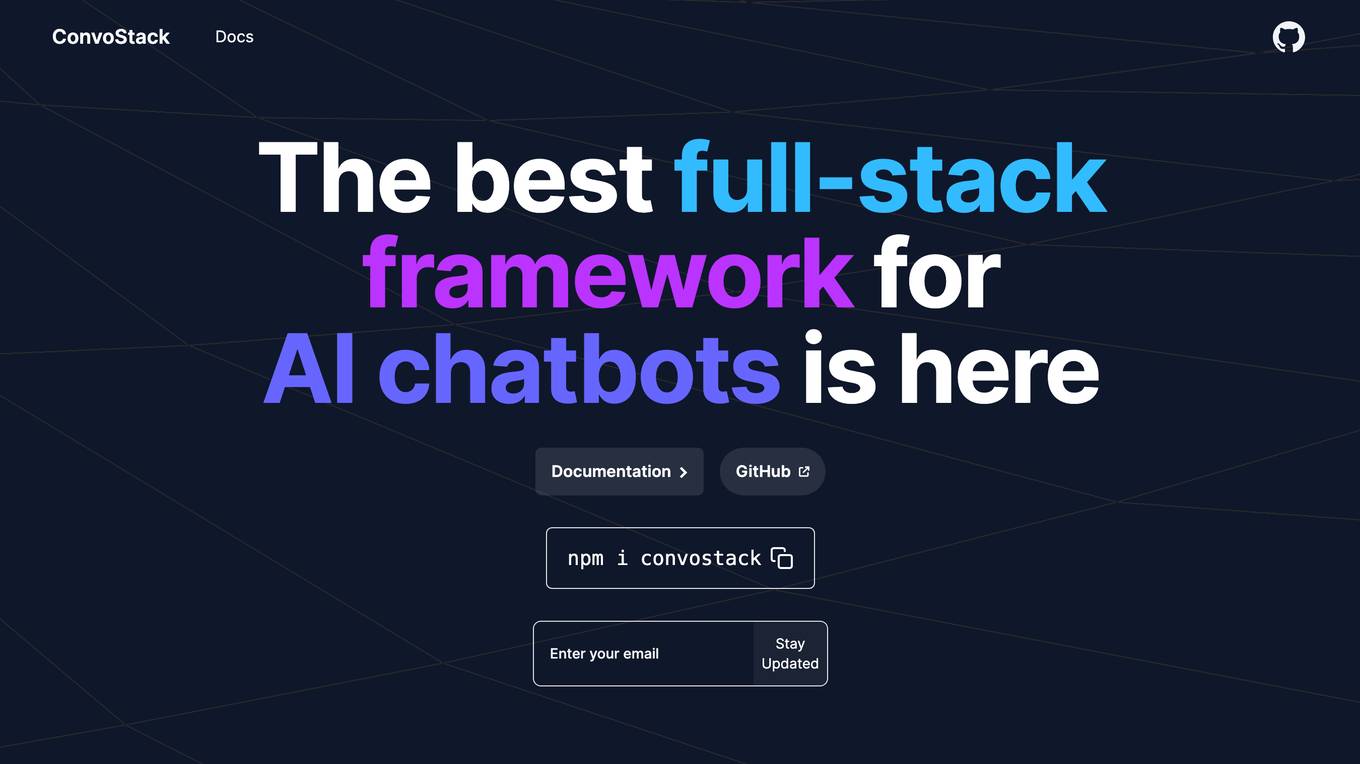
ConvoStack
ConvoStack is a free and open-source full-stack framework that makes it easy for developers to embed a customizable AI chatbot widget into a website with just a few lines of code. It supports popular frameworks such as Pinecone DB, Express, and React, and allows developers to integrate their own AI models using LangChain. ConvoStack is built on a tech stack that is used and loved by developers, and it is designed to be customizable for any use case.
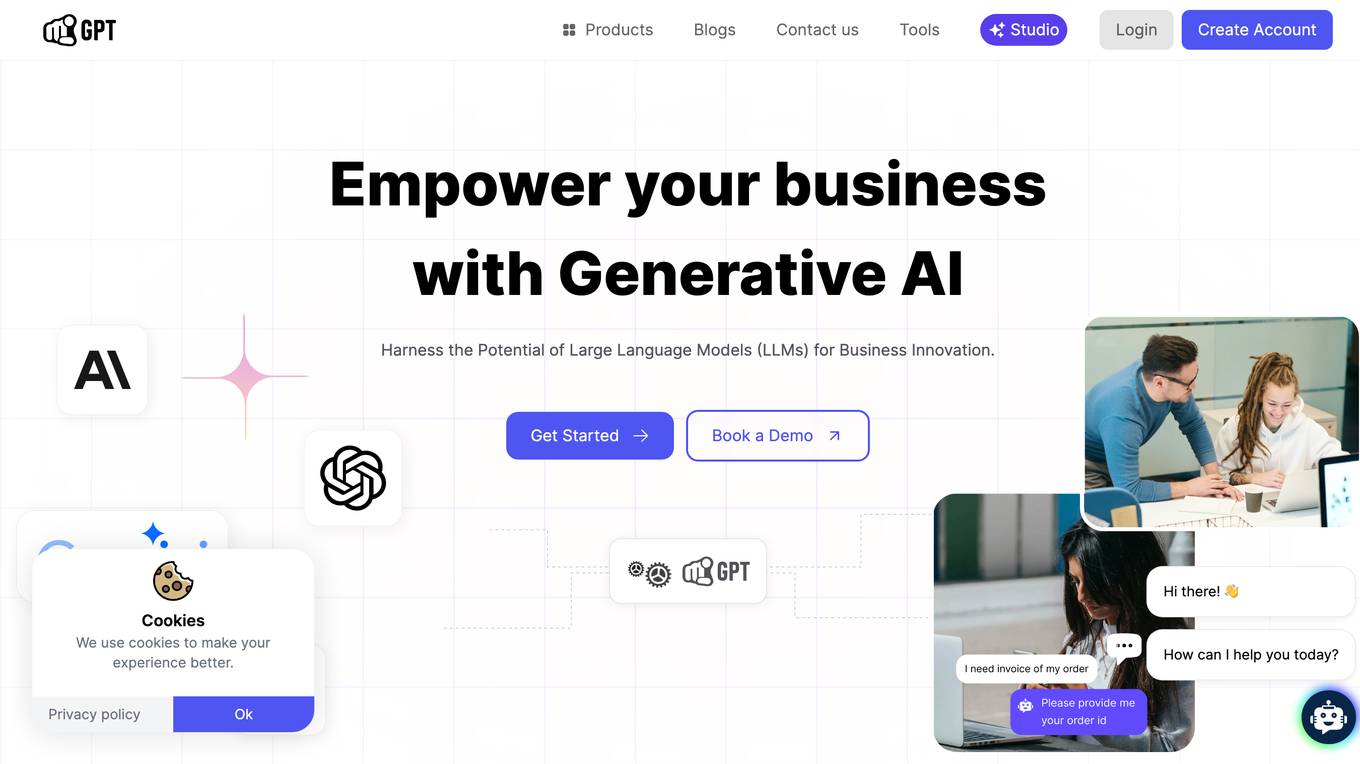
YourGPT
YourGPT is a suite of next-generation AI products designed to empower businesses with the potential of Large Language Models (LLMs). Its products include a no-code AI Chatbot solution for customer support and LLM Spark, a developer platform for building and deploying production-ready LLM applications. YourGPT prioritizes data security and is GDPR compliant, ensuring the privacy and protection of customer data. With over 2,000 satisfied customers, YourGPT has earned trust through its commitment to quality and customer satisfaction.
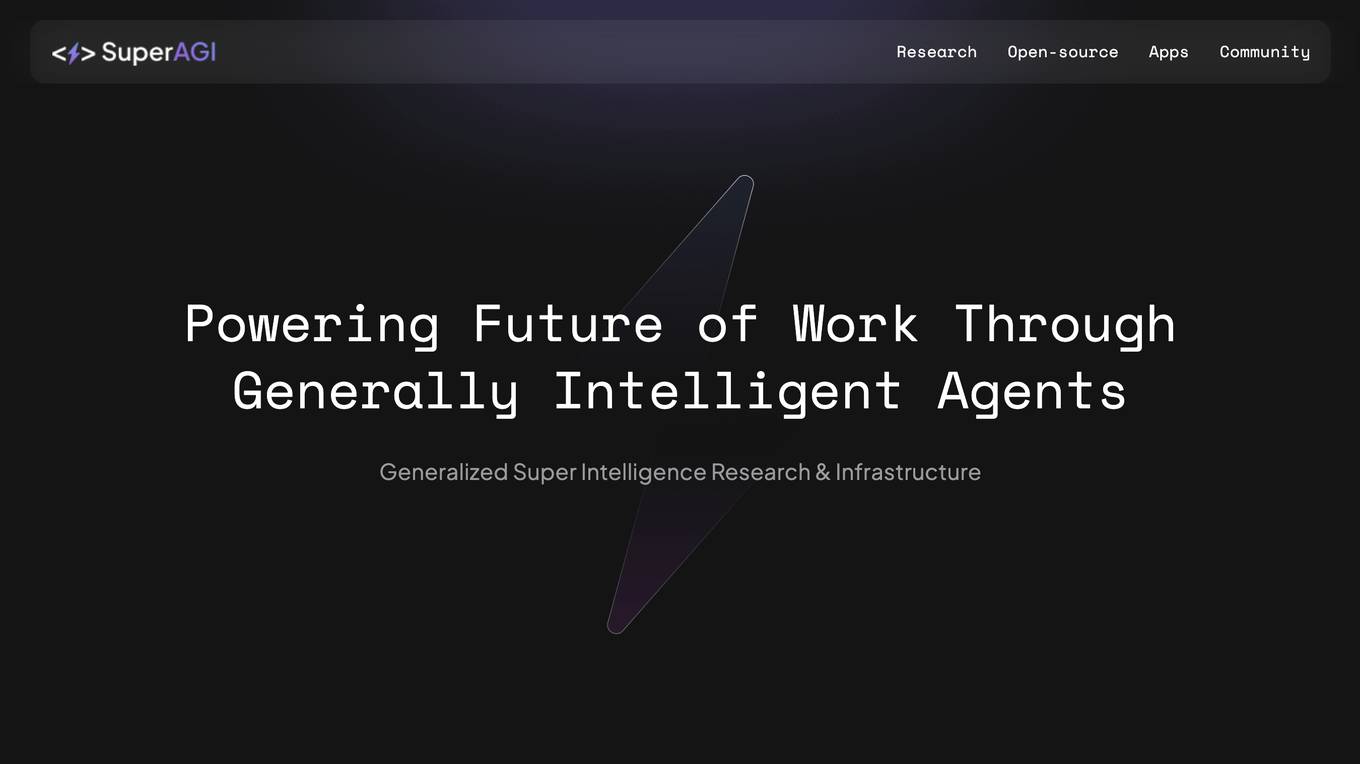
SuperAGI
SuperAGI is a leading research organization focused on Generalized Super Intelligence. They work on research in technical areas such as Neurosymbolic AI, Autonomous Agents & Multi-Agent Systems, New Model Architectures, System 2 Thinking, Recursive Self-Improving Systems, and other socio-economic super AGI-related topics such as Digital Workforce, Algorithmic Governance, UBI, etc.
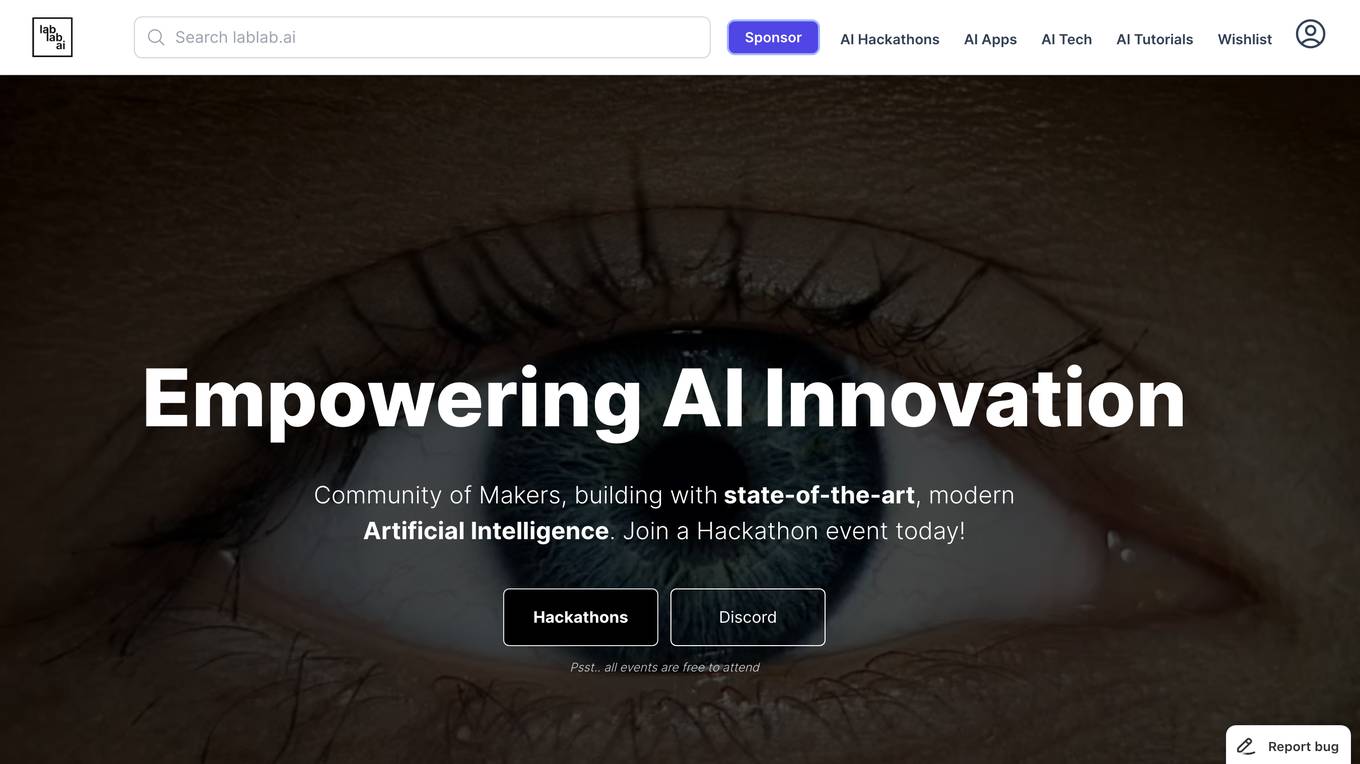
LabLab.ai
LabLab.ai is an online community and platform for artificial intelligence (AI) enthusiasts, developers, and innovators. The platform hosts AI hackathons, provides access to state-of-the-art AI technologies, and offers educational resources on AI. LabLab.ai aims to foster collaboration and innovation in the AI field and to make AI accessible to everyone.
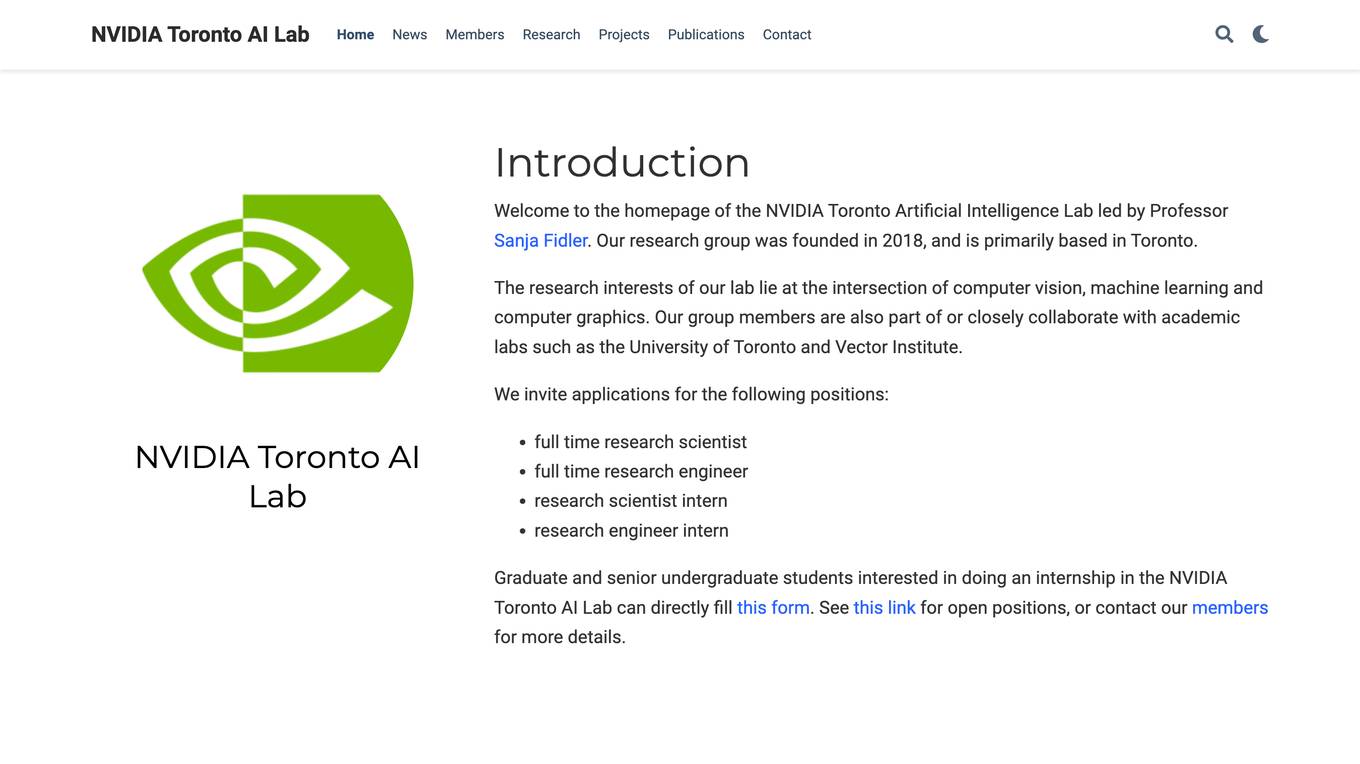
NVIDIA Toronto AI Lab
The NVIDIA Toronto AI Lab is a research laboratory focused on advancing the state-of-the-art in artificial intelligence. The lab's researchers are working on a wide range of AI topics, including deep learning, machine learning, computer vision, natural language processing, and robotics.
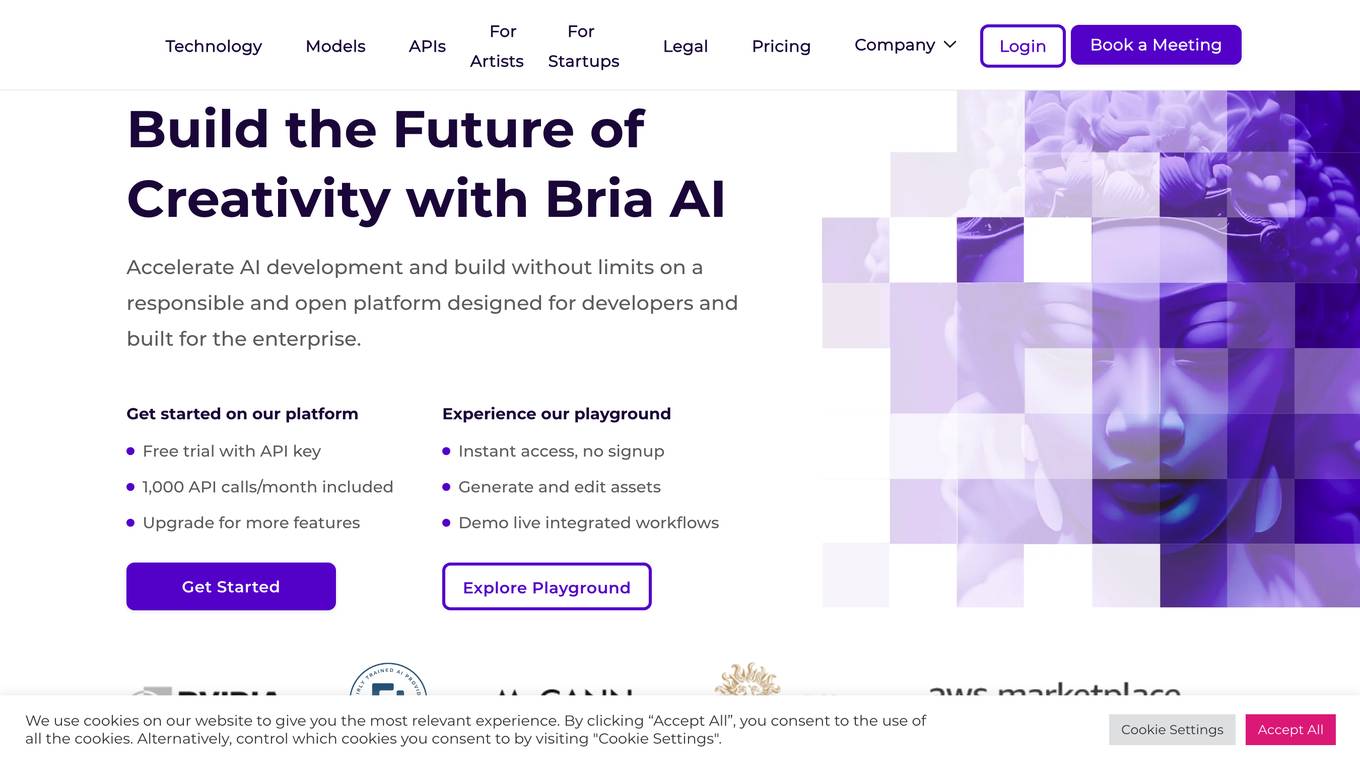
BRIA.ai
BRIA.ai is a visual generative AI platform that provides developers and businesses with the tools they need to build and deploy AI-powered applications. The platform includes a suite of pre-trained foundation models, APIs, and tools that can be used to generate and modify images, videos, and other visual content. BRIA.ai is committed to responsible AI practices and ensures that all of its models are trained on licensed and safe-to-use data.

FlowGPT
FlowGPT is a website that provides users with access to a collection of ChatGPT prompts and AI-powered bots. The website allows users to search for and use prompts to generate text, images, and other types of content. FlowGPT also offers a variety of tools and resources for developers and users who want to create their own AI-powered applications.
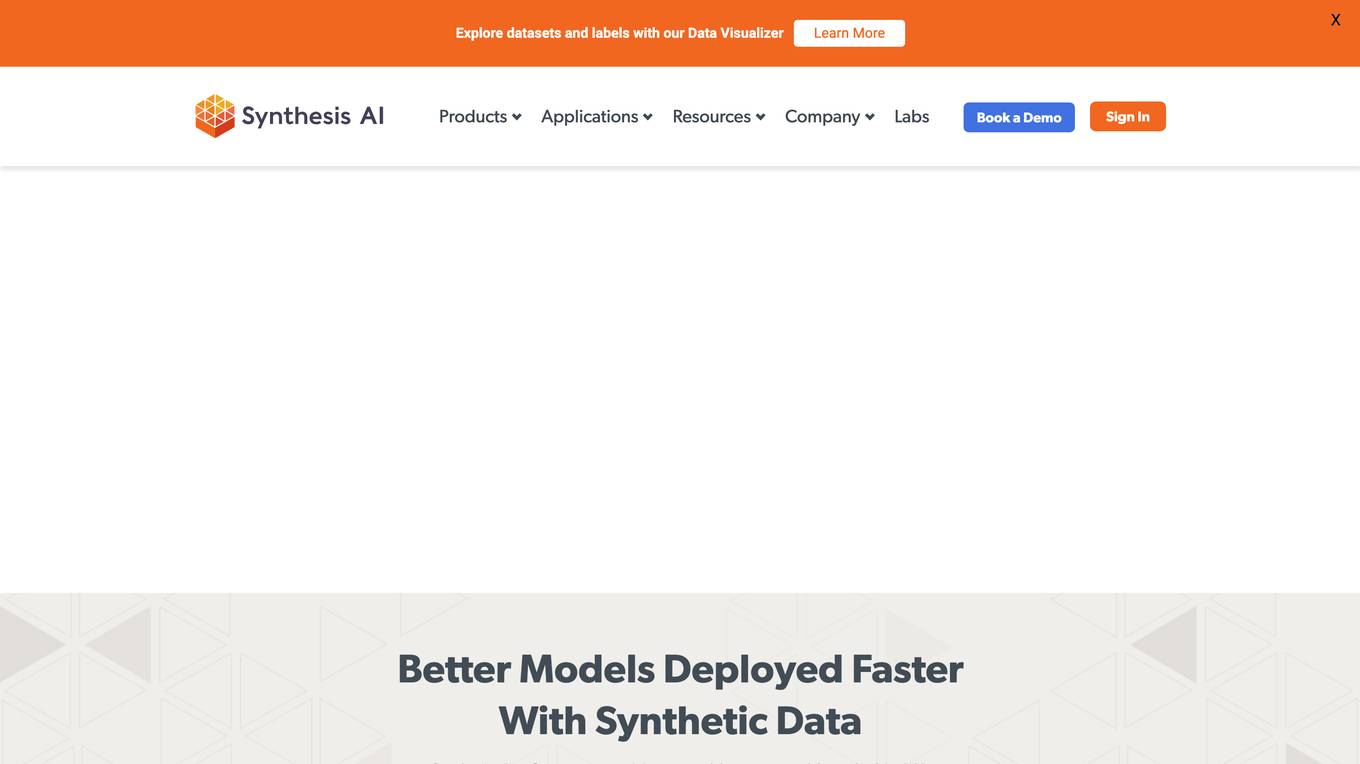
Synthesis AI
Synthesis AI is a synthetic data platform that enables more capable and ethical computer vision AI. It provides on-demand labeled images and videos, photorealistic images, and 3D generative AI to help developers build better models faster. Synthesis AI's products include Synthesis Humans, which allows users to create detailed images and videos of digital humans with rich annotations; Synthesis Scenarios, which enables users to craft complex multi-human simulations across a variety of environments; and a range of applications for industries such as ID verification, automotive, avatar creation, virtual fashion, AI fitness, teleconferencing, visual effects, and security.

般若AI
般若AI is an AI-powered platform that provides a variety of AI tools and services to help businesses and individuals with their AI needs. The platform offers a range of features, including AI training, AI consulting, and AI development. 般若AI also has a large community of AI experts who can provide support and guidance to users.
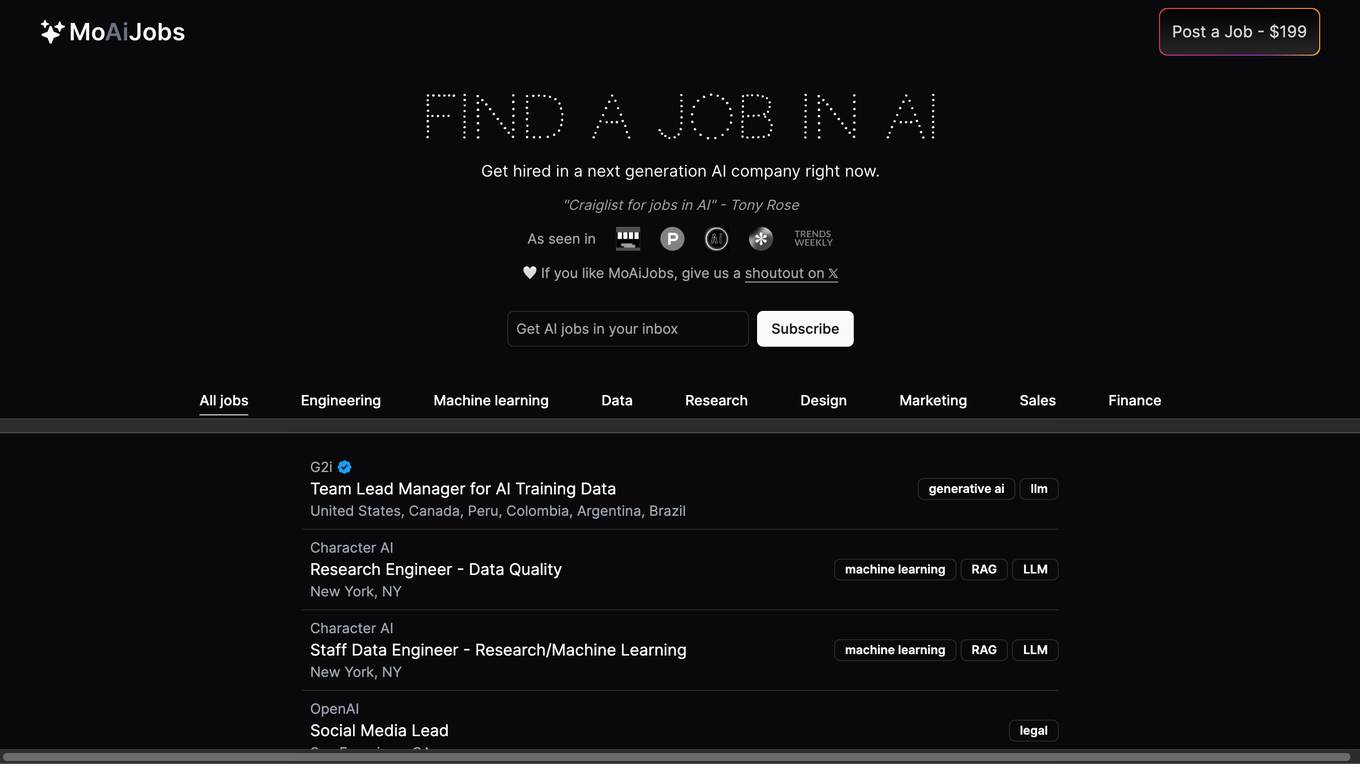
Mo Ai Jobs
Mo Ai Jobs is a job board for artificial intelligence (AI) professionals. It lists jobs in machine learning, engineering, research, data science, and other AI-related fields. The site is designed to help AI professionals find jobs at next-generation AI companies. Mo Ai Jobs is a valuable resource for anyone looking for a job in the AI industry.
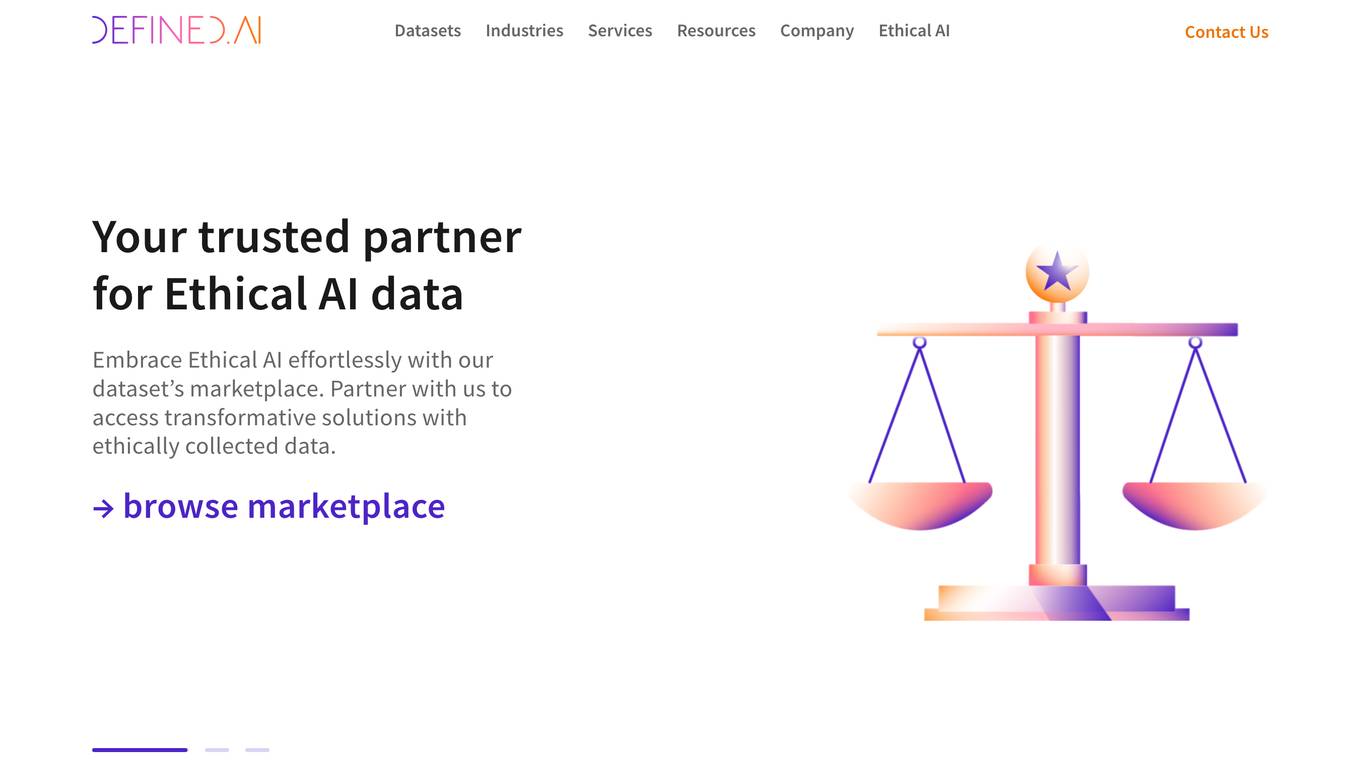
Defined.ai
Defined.ai is a leading provider of high-quality and ethical data for AI applications. Founded in 2015, Defined.ai has a global presence with offices in the US, Europe, and Asia. The company's mission is to make AI more accessible and ethical by providing a marketplace for buying and selling AI data, tools, and models. Defined.ai also offers professional services to help deliver success in complex machine learning projects.
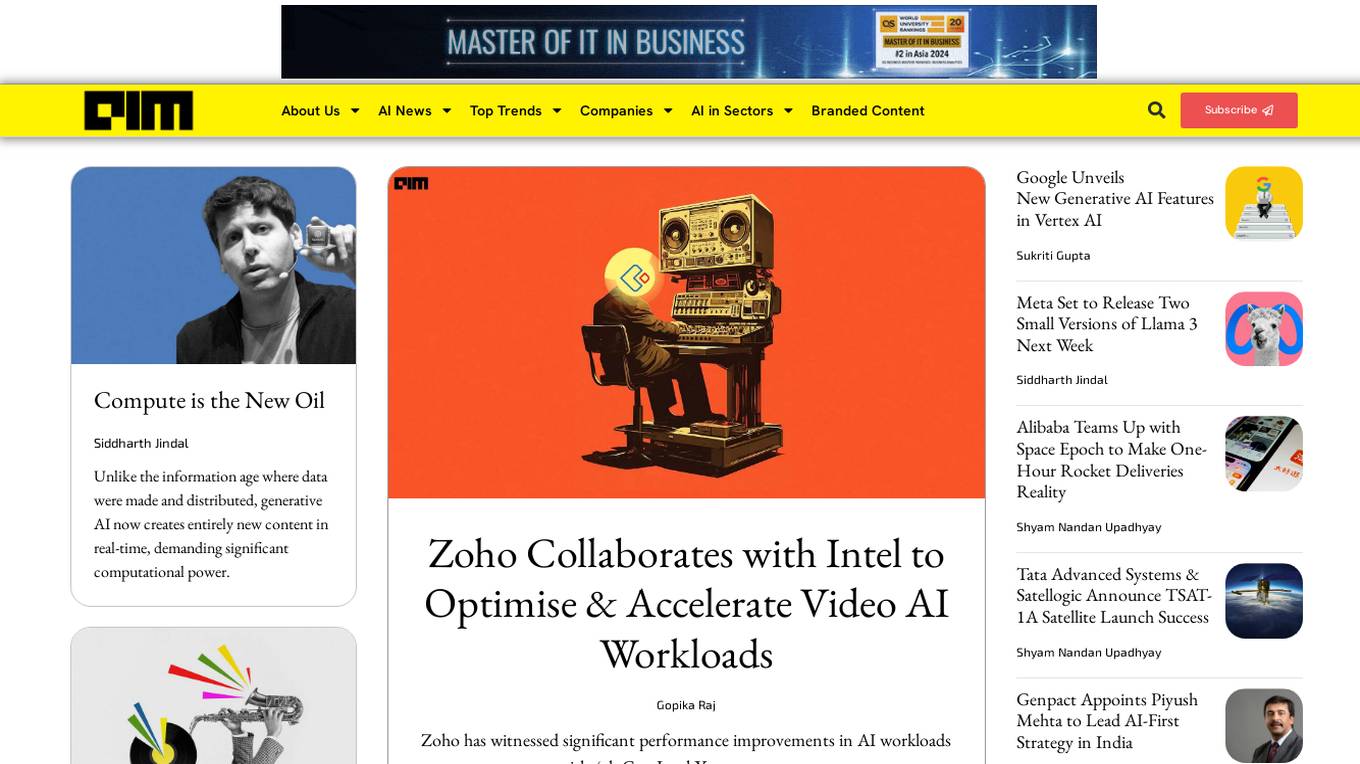
Analytics India Magazine
Analytics India Magazine is a leading publication covering the latest advancements in artificial intelligence, data science, and machine learning. The website provides in-depth analysis, interviews with industry experts, and insights into the impact of AI on various sectors. It also hosts events and conferences that bring together professionals and thought leaders in the field.
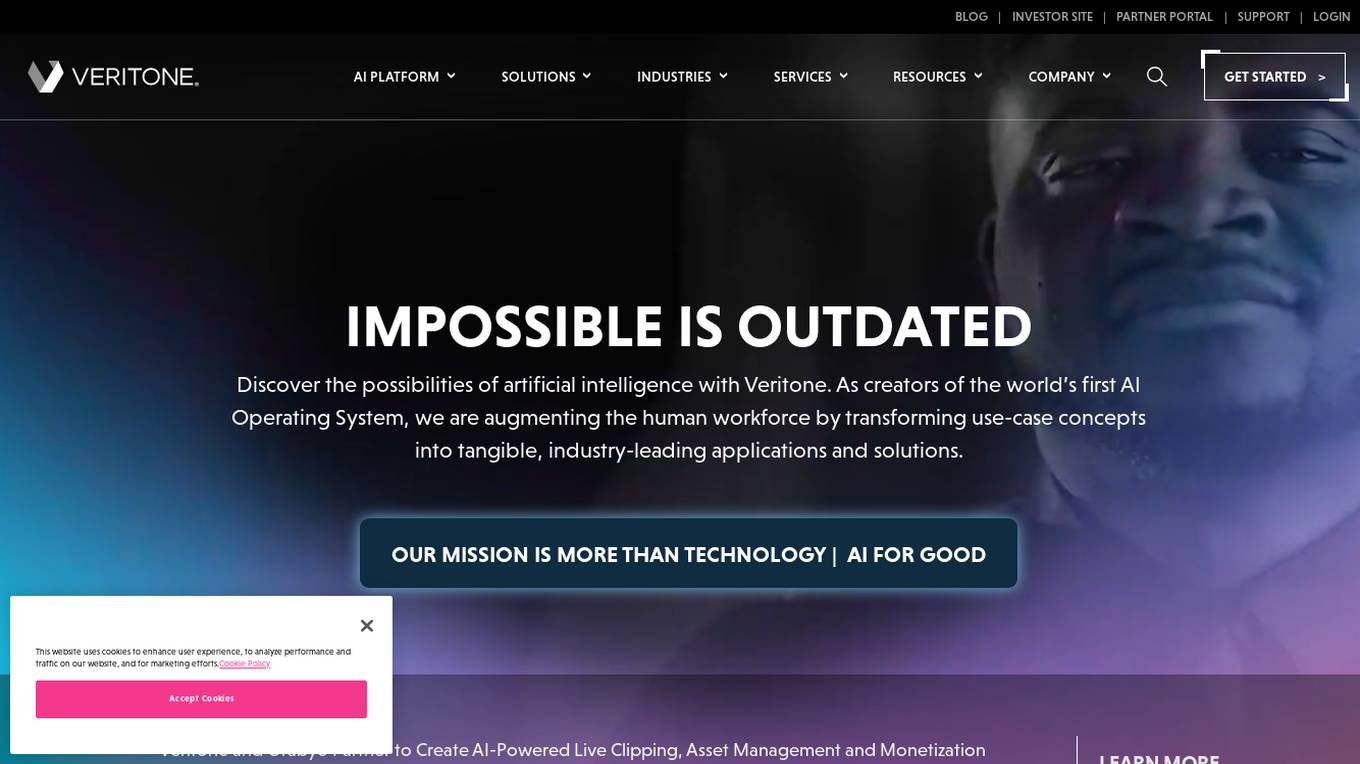
Veritone
Veritone is a leading provider of artificial intelligence (AI) solutions for businesses. Its flagship product, aiWARE, is an enterprise AI platform that provides access to hundreds of cognitive engines through one common software infrastructure. Veritone's AI solutions are used by businesses in a variety of industries, including media and entertainment, recruitment, government, legal and compliance, and sports. Veritone's mission is to augment the human workforce by transforming use-case concepts into tangible, industry-leading applications and solutions.
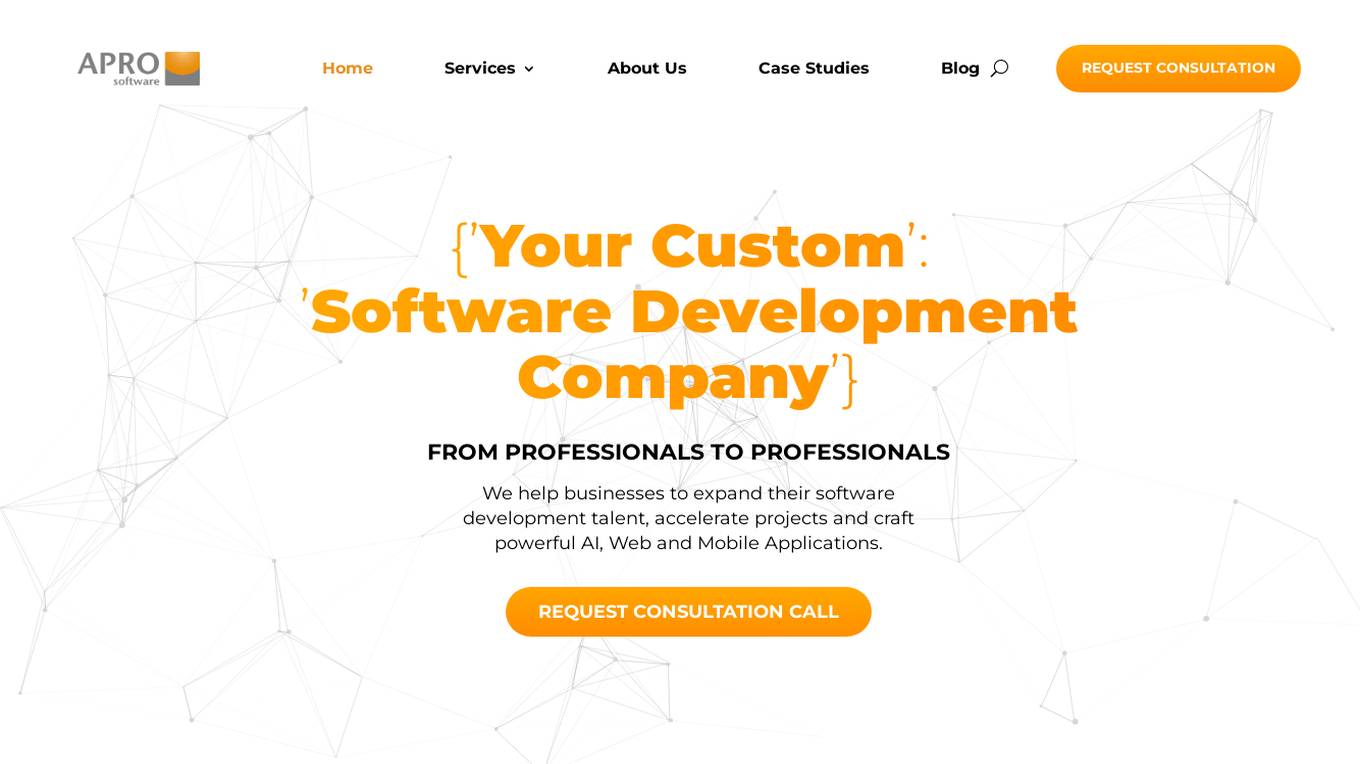
Apro Software
Apro Software is a custom software development company that specializes in AI, web, and mobile applications. They offer a range of services, including software development, consulting, and training. Apro Software has a team of experienced developers and engineers who are passionate about creating innovative and effective software solutions. They have a proven track record of success, and their clients include some of the world's leading companies.

Denvr DataWorks AI Cloud
Denvr DataWorks AI Cloud is a cloud-based AI platform that provides end-to-end AI solutions for businesses. It offers a range of features including high-performance GPUs, scalable infrastructure, ultra-efficient workflows, and cost efficiency. Denvr DataWorks is an NVIDIA Elite Partner for Compute, and its platform is used by leading AI companies to develop and deploy innovative AI solutions.
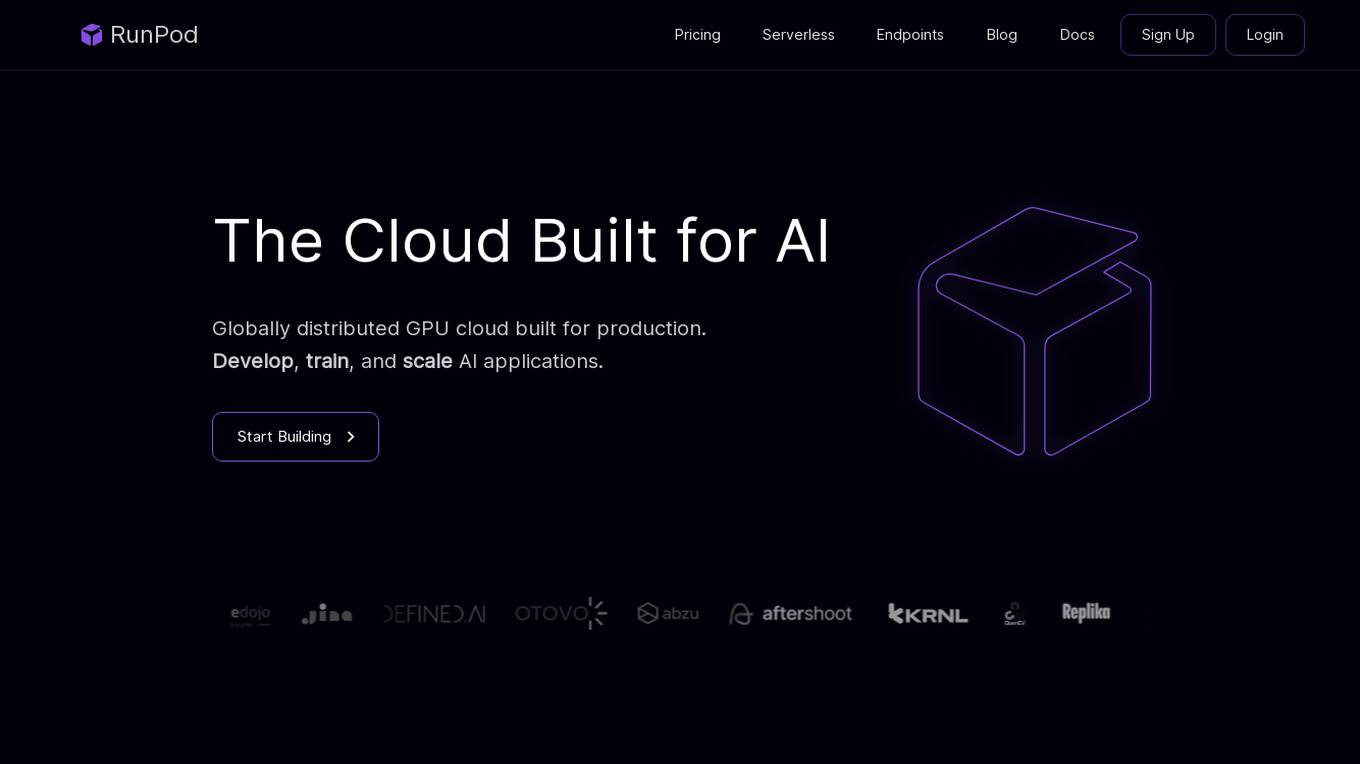
RunPod
RunPod is a cloud platform specifically designed for AI development and deployment. It offers a range of features to streamline the process of developing, training, and scaling AI models, including a library of pre-built templates, efficient training pipelines, and scalable deployment options. RunPod also provides access to a wide selection of GPUs, allowing users to choose the optimal hardware for their specific AI workloads.
24 - Open Source AI Tools

zep-python
Zep is an open-source platform for building and deploying large language model (LLM) applications. It provides a suite of tools and services that make it easy to integrate LLMs into your applications, including chat history memory, embedding, vector search, and data enrichment. Zep is designed to be scalable, reliable, and easy to use, making it a great choice for developers who want to build LLM-powered applications quickly and easily.
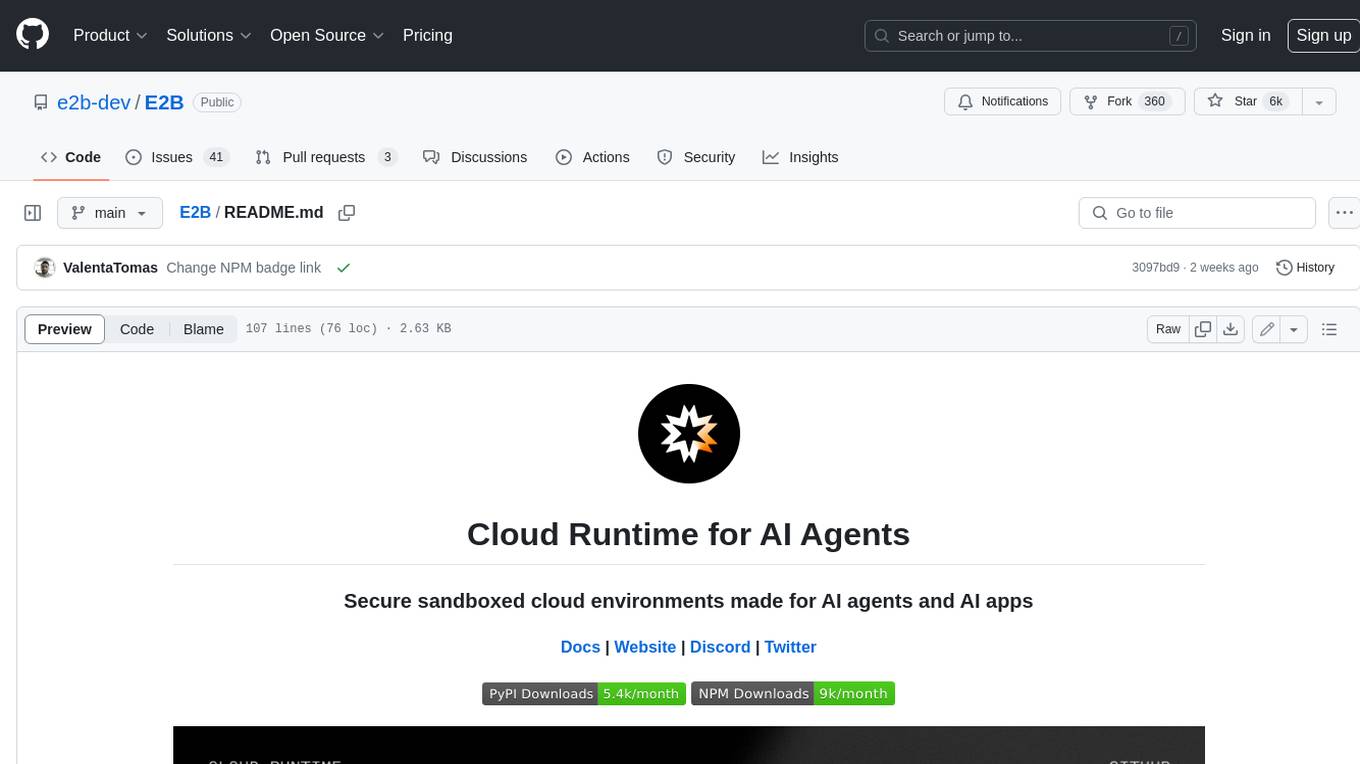
E2B
E2B Sandbox is a secure sandboxed cloud environment made for AI agents and AI apps. Sandboxes allow AI agents and apps to have long running cloud secure environments. In these environments, large language models can use the same tools as humans do. For example: * Cloud browsers * GitHub repositories and CLIs * Coding tools like linters, autocomplete, "go-to defintion" * Running LLM generated code * Audio & video editing The E2B sandbox can be connected to any LLM and any AI agent or app.
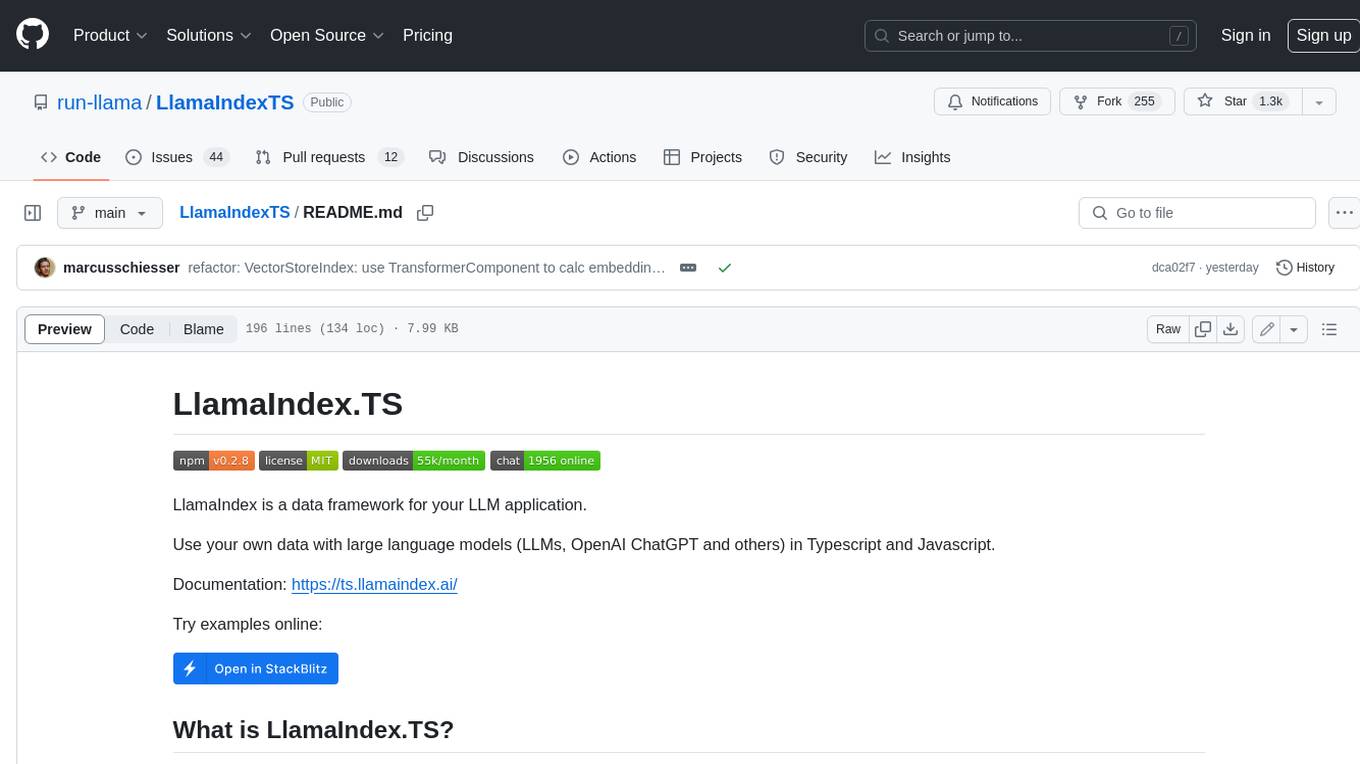
LlamaIndexTS
LlamaIndex.TS is a data framework for your LLM application. Use your own data with large language models (LLMs, OpenAI ChatGPT and others) in Typescript and Javascript.

floneum
Floneum is a graph editor that makes it easy to develop your own AI workflows. It uses large language models (LLMs) to run AI models locally, without any external dependencies or even a GPU. This makes it easy to use LLMs with your own data, without worrying about privacy. Floneum also has a plugin system that allows you to improve the performance of LLMs and make them work better for your specific use case. Plugins can be used in any language that supports web assembly, and they can control the output of LLMs with a process similar to JSONformer or guidance.
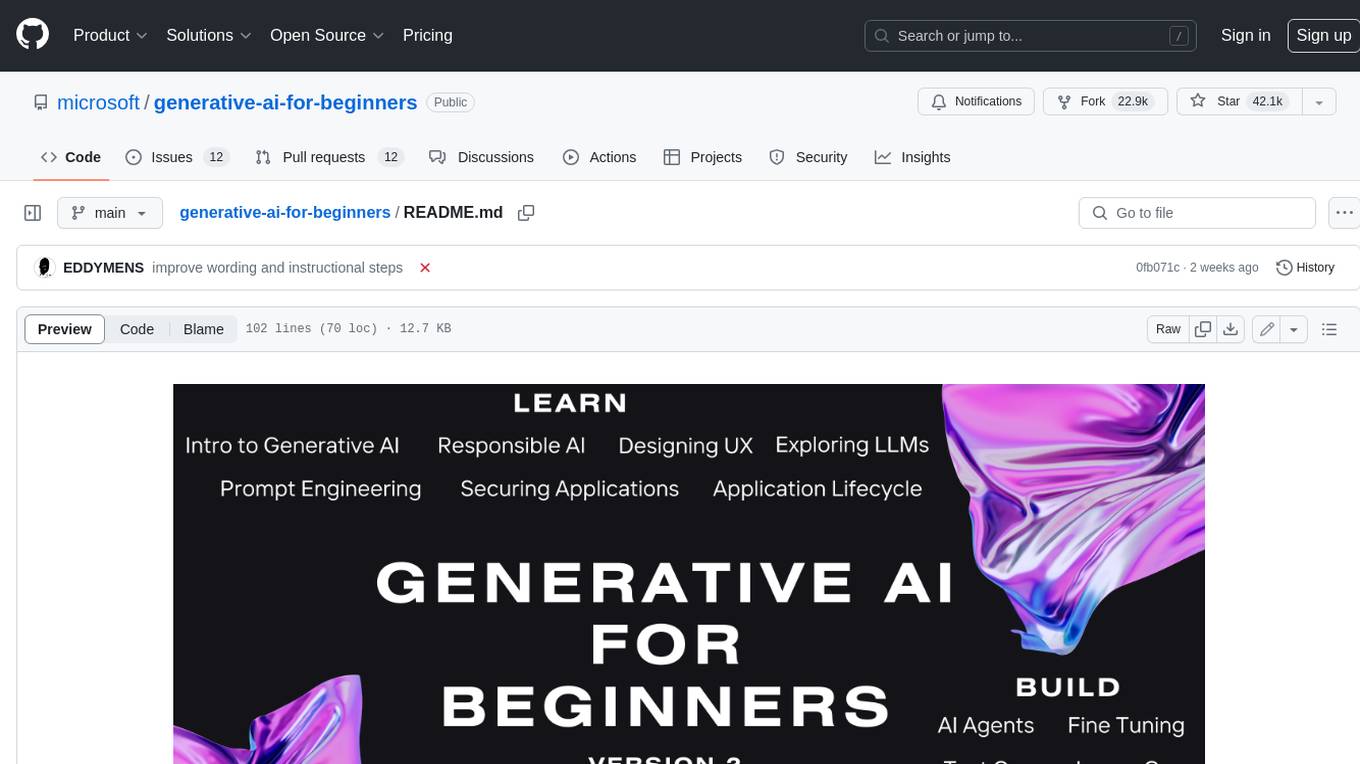
generative-ai-for-beginners
This course has 18 lessons. Each lesson covers its own topic so start wherever you like! Lessons are labeled either "Learn" lessons explaining a Generative AI concept or "Build" lessons that explain a concept and code examples in both **Python** and **TypeScript** when possible. Each lesson also includes a "Keep Learning" section with additional learning tools. **What You Need** * Access to the Azure OpenAI Service **OR** OpenAI API - _Only required to complete coding lessons_ * Basic knowledge of Python or Typescript is helpful - *For absolute beginners check out these Python and TypeScript courses. * A Github account to fork this entire repo to your own GitHub account We have created a **Course Setup** lesson to help you with setting up your development environment. Don't forget to star (🌟) this repo to find it easier later. ## 🧠 Ready to Deploy? If you are looking for more advanced code samples, check out our collection of Generative AI Code Samples in both **Python** and **TypeScript**. ## 🗣️ Meet Other Learners, Get Support Join our official AI Discord server to meet and network with other learners taking this course and get support. ## 🚀 Building a Startup? Sign up for Microsoft for Startups Founders Hub to receive **free OpenAI credits** and up to **$150k towards Azure credits to access OpenAI models through Azure OpenAI Services**. ## 🙏 Want to help? Do you have suggestions or found spelling or code errors? Raise an issue or Create a pull request ## 📂 Each lesson includes: * A short video introduction to the topic * A written lesson located in the README * Python and TypeScript code samples supporting Azure OpenAI and OpenAI API * Links to extra resources to continue your learning ## 🗃️ Lessons | | Lesson Link | Description | Additional Learning | | :-: | :------------------------------------------------------------------------------------------------------------------------------------------: | :---------------------------------------------------------------------------------------------: | ------------------------------------------------------------------------------ | | 00 | Course Setup | **Learn:** How to Setup Your Development Environment | Learn More | | 01 | Introduction to Generative AI and LLMs | **Learn:** Understanding what Generative AI is and how Large Language Models (LLMs) work. | Learn More | | 02 | Exploring and comparing different LLMs | **Learn:** How to select the right model for your use case | Learn More | | 03 | Using Generative AI Responsibly | **Learn:** How to build Generative AI Applications responsibly | Learn More | | 04 | Understanding Prompt Engineering Fundamentals | **Learn:** Hands-on Prompt Engineering Best Practices | Learn More | | 05 | Creating Advanced Prompts | **Learn:** How to apply prompt engineering techniques that improve the outcome of your prompts. | Learn More | | 06 | Building Text Generation Applications | **Build:** A text generation app using Azure OpenAI | Learn More | | 07 | Building Chat Applications | **Build:** Techniques for efficiently building and integrating chat applications. | Learn More | | 08 | Building Search Apps Vector Databases | **Build:** A search application that uses Embeddings to search for data. | Learn More | | 09 | Building Image Generation Applications | **Build:** A image generation application | Learn More | | 10 | Building Low Code AI Applications | **Build:** A Generative AI application using Low Code tools | Learn More | | 11 | Integrating External Applications with Function Calling | **Build:** What is function calling and its use cases for applications | Learn More | | 12 | Designing UX for AI Applications | **Learn:** How to apply UX design principles when developing Generative AI Applications | Learn More | | 13 | Securing Your Generative AI Applications | **Learn:** The threats and risks to AI systems and methods to secure these systems. | Learn More | | 14 | The Generative AI Application Lifecycle | **Learn:** The tools and metrics to manage the LLM Lifecycle and LLMOps | Learn More | | 15 | Retrieval Augmented Generation (RAG) and Vector Databases | **Build:** An application using a RAG Framework to retrieve embeddings from a Vector Databases | Learn More | | 16 | Open Source Models and Hugging Face | **Build:** An application using open source models available on Hugging Face | Learn More | | 17 | AI Agents | **Build:** An application using an AI Agent Framework | Learn More | | 18 | Fine-Tuning LLMs | **Learn:** The what, why and how of fine-tuning LLMs | Learn More |

carrot
The 'carrot' repository on GitHub provides a list of free and user-friendly ChatGPT mirror sites for easy access. The repository includes sponsored sites offering various GPT models and services. Users can find and share sites, report errors, and access stable and recommended sites for ChatGPT usage. The repository also includes a detailed list of ChatGPT sites, their features, and accessibility options, making it a valuable resource for ChatGPT users seeking free and unlimited GPT services.
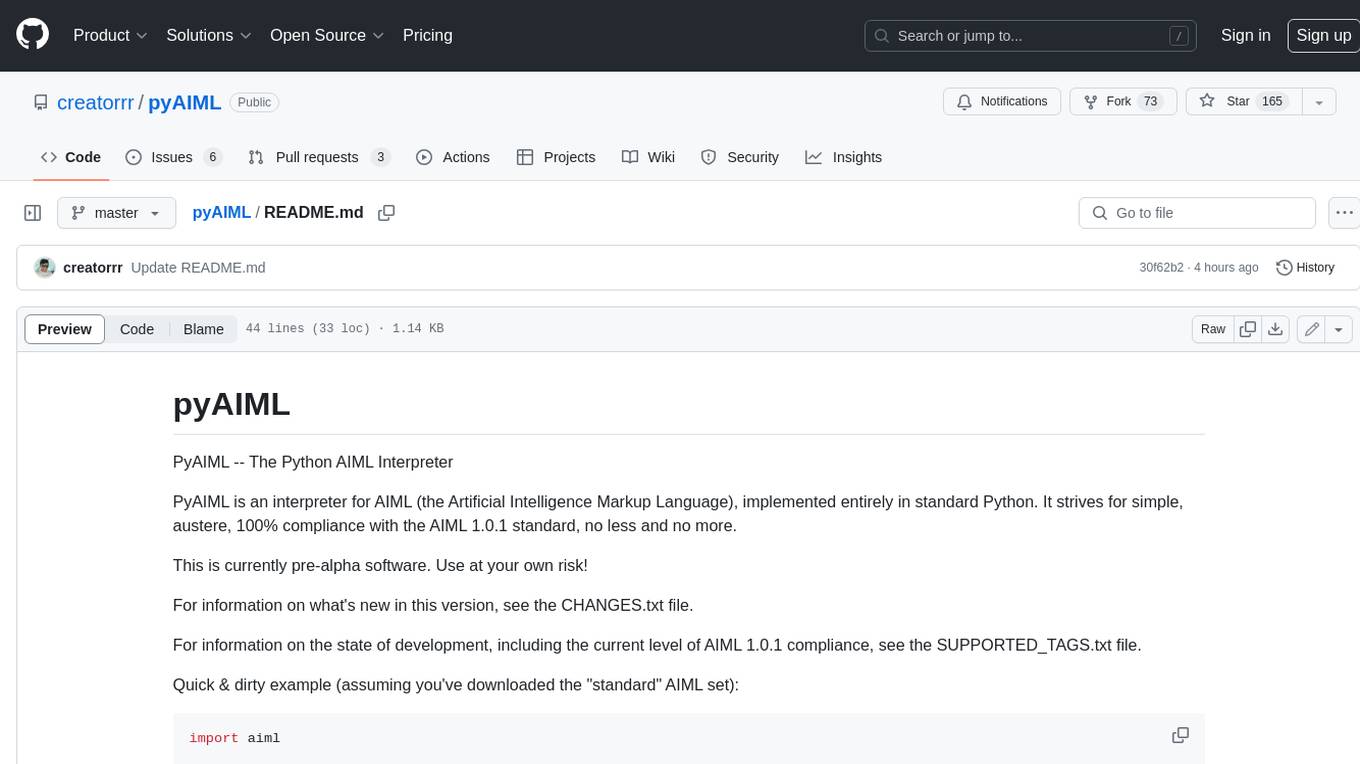
pyAIML
PyAIML is a Python implementation of the AIML (Artificial Intelligence Markup Language) interpreter. It aims to be a simple, standards-compliant interpreter for AIML 1.0.1. PyAIML is currently in pre-alpha development, so use it at your own risk. For more information on PyAIML, see the CHANGES.txt and SUPPORTED_TAGS.txt files.
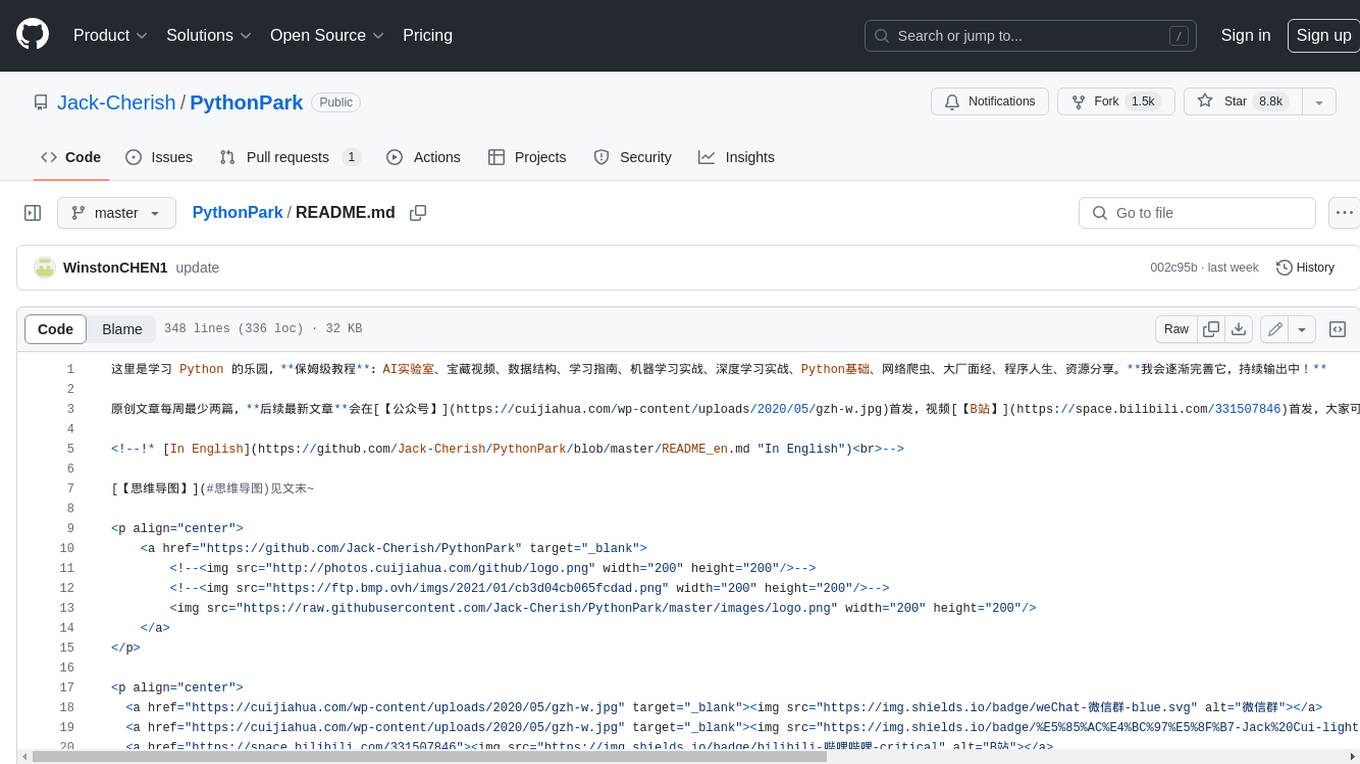
PythonPark
PythonPark is a paradise for learning Python, providing babysitter-level tutorials on AI labs, treasure videos, data structures, study guides, machine learning practicals, deep learning practicals, Python basics, web scraping, big company interview experiences, programming life, and resource sharing. Original articles are published at least twice a week, with the latest articles being first released on WeChat and videos on Bilibili. Join the WeChat group for technical discussions or to provide feedback. Continuously improving and outputting content!
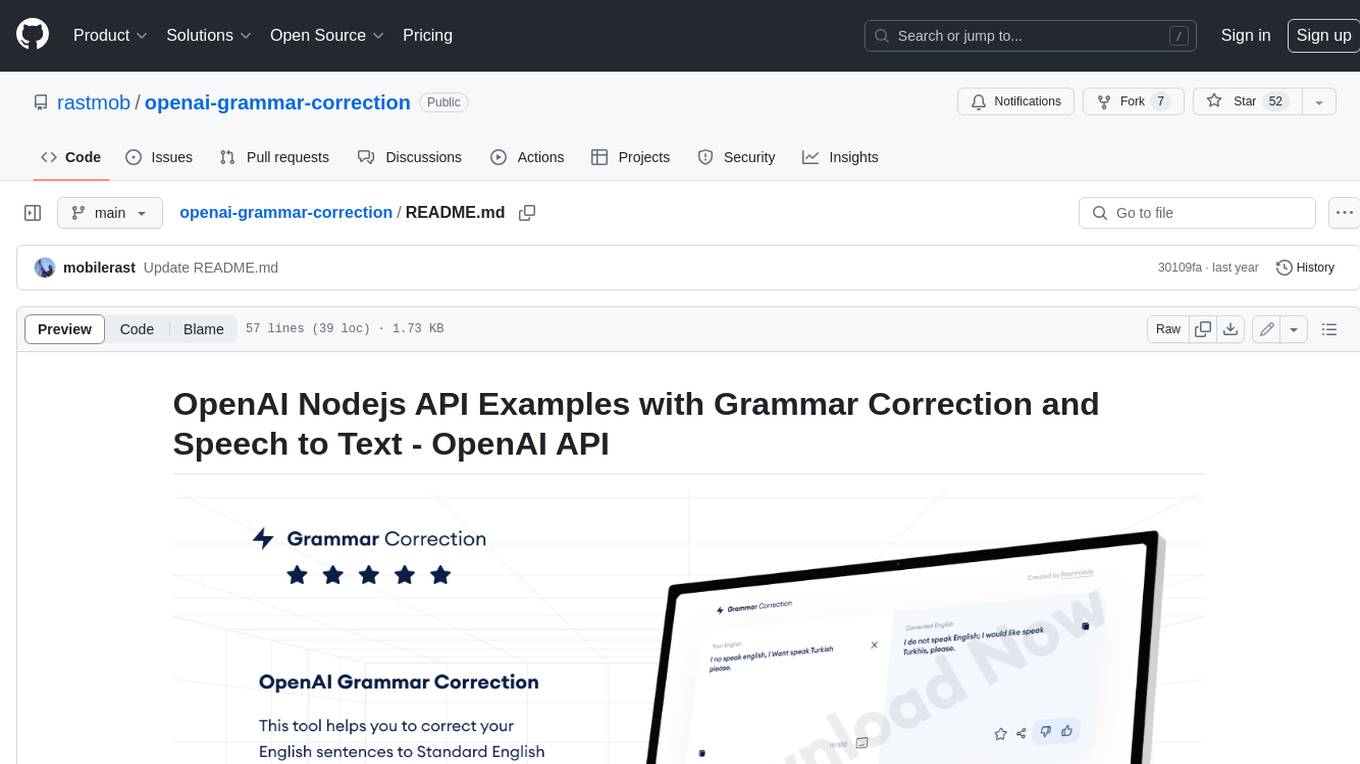
openai-grammar-correction
This project is a Node.js API example that utilizes the OpenAI API for grammar correction and speech-to-text conversion. It helps users correct their English sentences to standard English by leveraging the capabilities of the OpenAI API. The project consists of two applications: Angular and Node.js. Users can follow the installation steps to set up the project in their environment and utilize the OpenAI implementation to correct English sentences. The project also provides guidelines for contribution and support.

learn-generative-ai
Learn Cloud Applied Generative AI Engineering (GenEng) is a course focusing on the application of generative AI technologies in various industries. The course covers topics such as the economic impact of generative AI, the role of developers in adopting and integrating generative AI technologies, and the future trends in generative AI. Students will learn about tools like OpenAI API, LangChain, and Pinecone, and how to build and deploy Large Language Models (LLMs) for different applications. The course also explores the convergence of generative AI with Web 3.0 and its potential implications for decentralized intelligence.
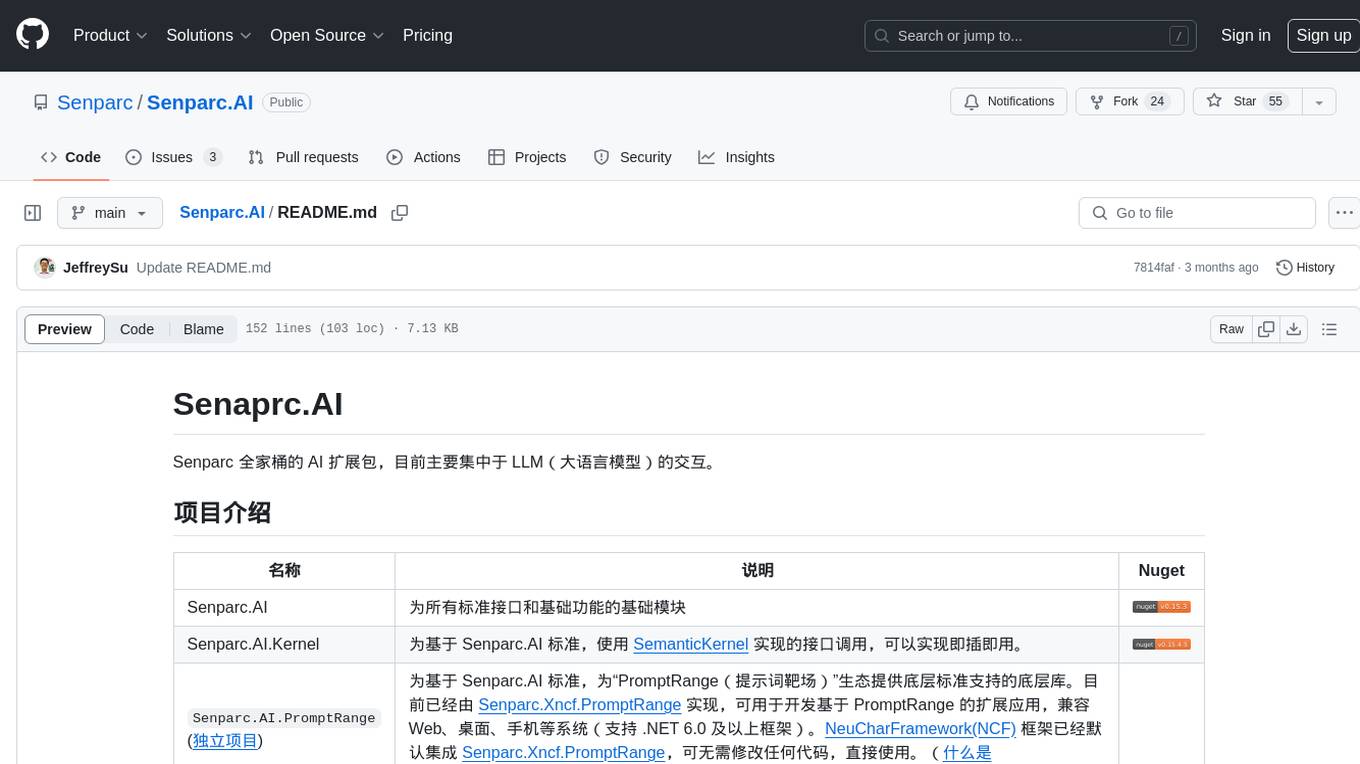
Senparc.AI
Senparc.AI is an AI extension package for the Senparc ecosystem, focusing on LLM (Large Language Models) interaction. It provides modules for standard interfaces and basic functionalities, as well as interfaces using SemanticKernel for plug-and-play capabilities. The package also includes a library for supporting the 'PromptRange' ecosystem, compatible with various systems and frameworks. Users can configure different AI platforms and models, define AI interface parameters, and run AI functions easily. The package offers examples and commands for dialogue, embedding, and DallE drawing operations.
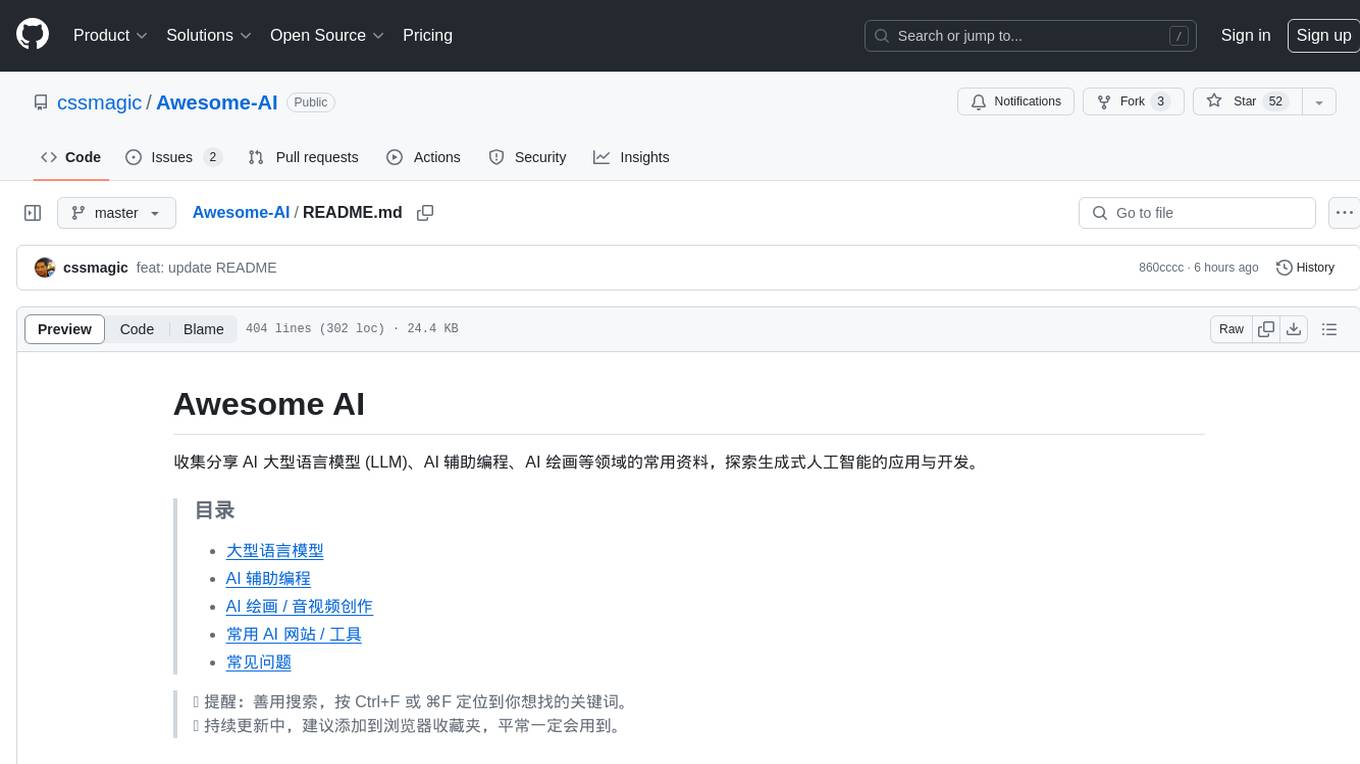
Awesome-AI
Awesome AI is a repository that collects and shares resources in the fields of large language models (LLM), AI-assisted programming, AI drawing, and more. It explores the application and development of generative artificial intelligence. The repository provides information on various AI tools, models, and platforms, along with tutorials and web products related to AI technologies.
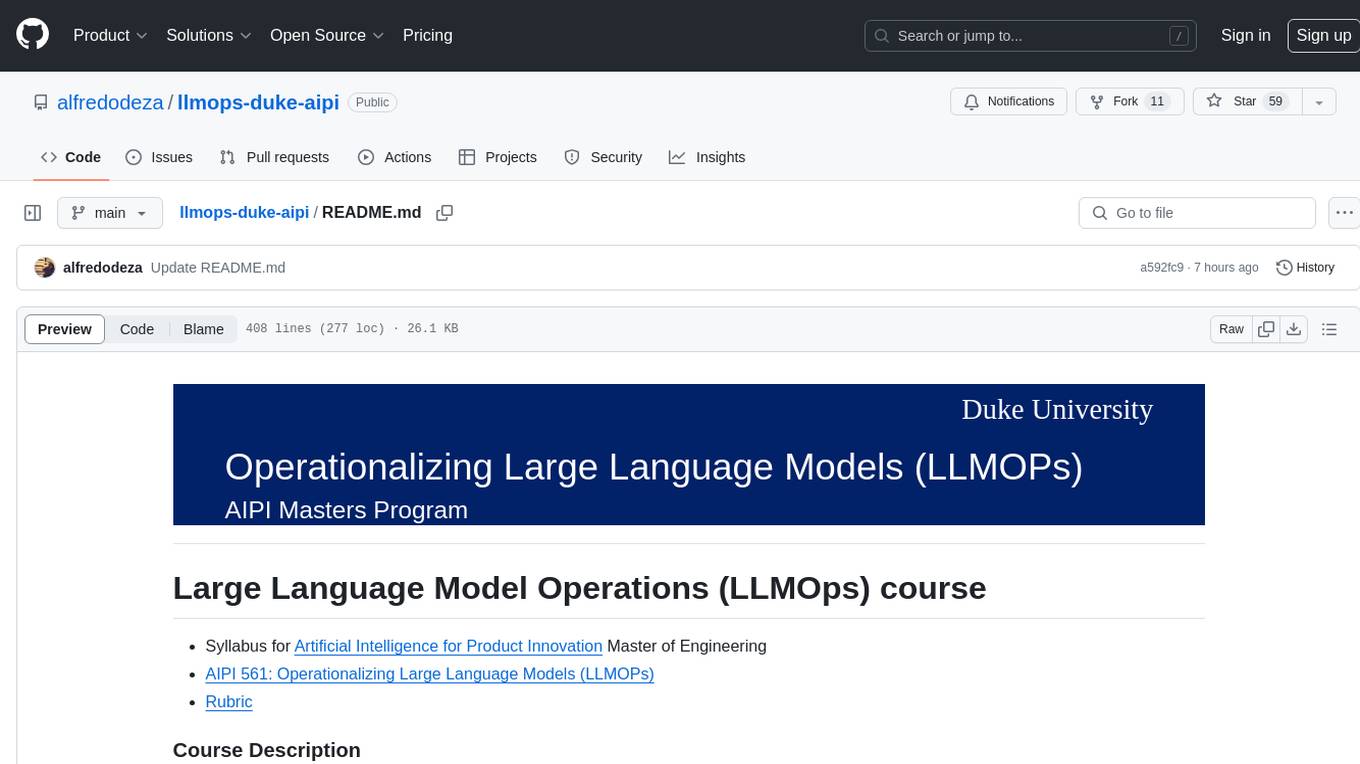
llmops-duke-aipi
LLMOps Duke AIPI is a course focused on operationalizing Large Language Models, teaching methodologies for developing applications using software development best practices with large language models. The course covers various topics such as generative AI concepts, setting up development environments, interacting with large language models, using local large language models, applied solutions with LLMs, extensibility using plugins and functions, retrieval augmented generation, introduction to Python web frameworks for APIs, DevOps principles, deploying machine learning APIs, LLM platforms, and final presentations. Students will learn to build, share, and present portfolios using Github, YouTube, and Linkedin, as well as develop non-linear life-long learning skills. Prerequisites include basic Linux and programming skills, with coursework available in Python or Rust. Additional resources and references are provided for further learning and exploration.
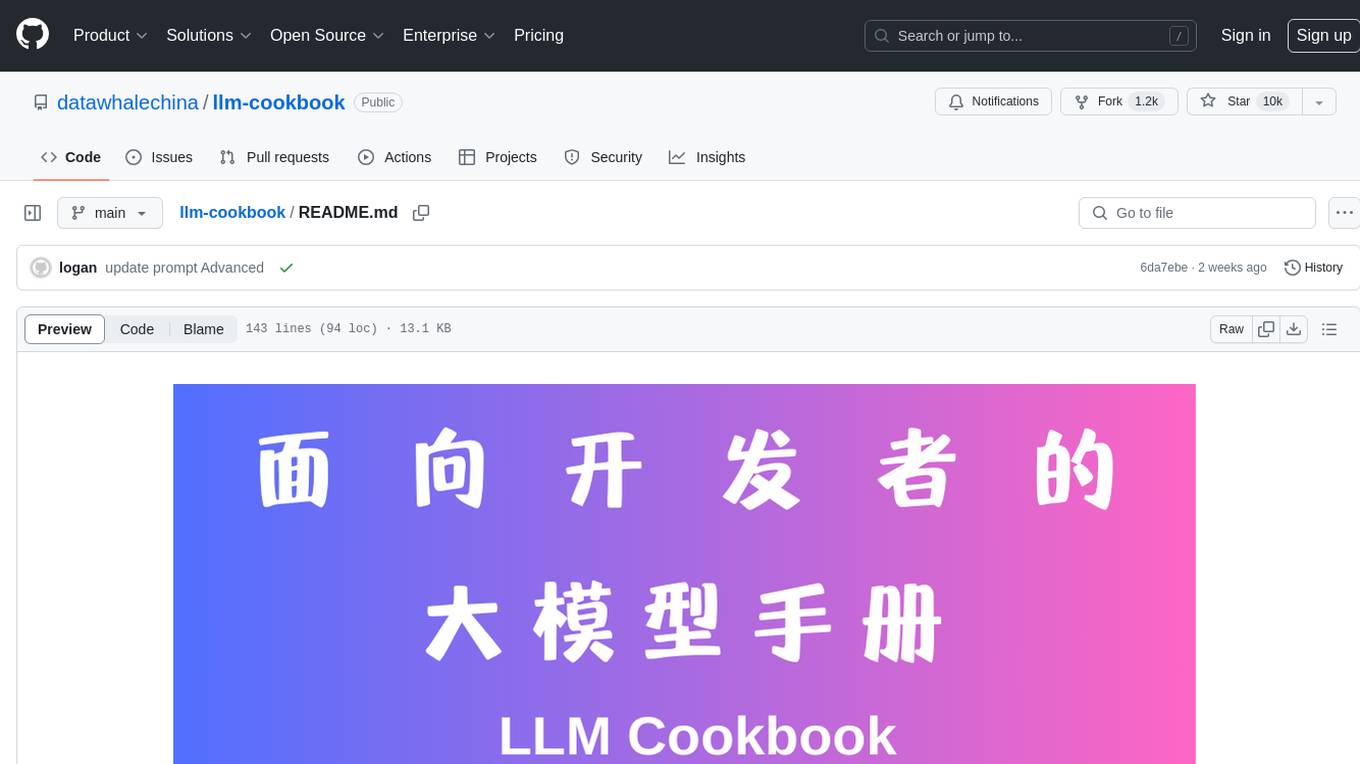
llm-cookbook
LLM Cookbook is a developer-oriented comprehensive guide focusing on LLM for Chinese developers. It covers various aspects from Prompt Engineering to RAG development and model fine-tuning, providing guidance on how to learn and get started with LLM projects in a way suitable for Chinese learners. The project translates and reproduces 11 courses from Professor Andrew Ng's large model series, categorizing them for beginners to systematically learn essential skills and concepts before exploring specific interests. It encourages developers to contribute by replicating unreproduced courses following the format and submitting PRs for review and merging. The project aims to help developers grasp a wide range of skills and concepts related to LLM development, offering both online reading and PDF versions for easy access and learning.
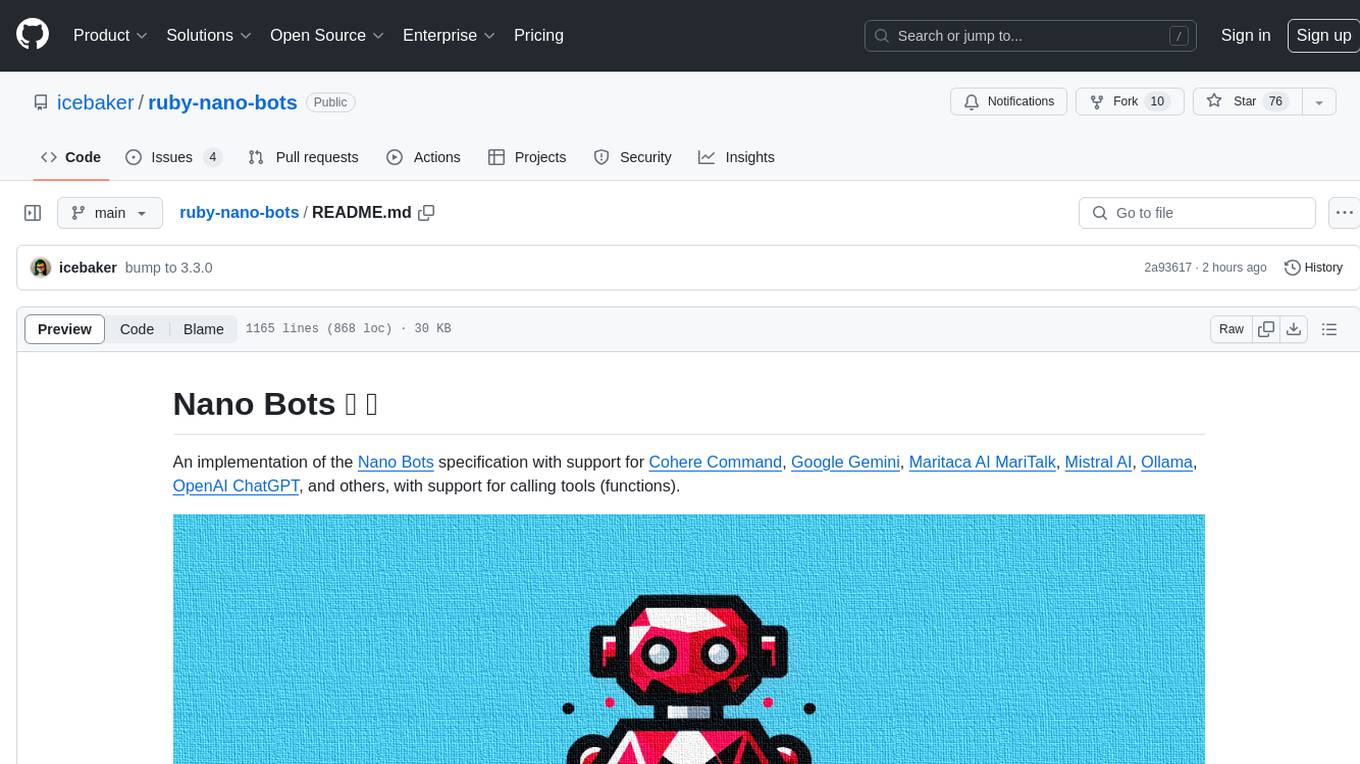
ruby-nano-bots
Ruby Nano Bots is an implementation of the Nano Bots specification supporting various AI providers like Cohere Command, Google Gemini, Maritaca AI MariTalk, Mistral AI, Ollama, OpenAI ChatGPT, and others. It allows calling tools (functions) and provides a helpful assistant for interacting with AI language models. The tool can be used both from the command line and as a library in Ruby projects, offering features like REPL, debugging, and encryption for data privacy.
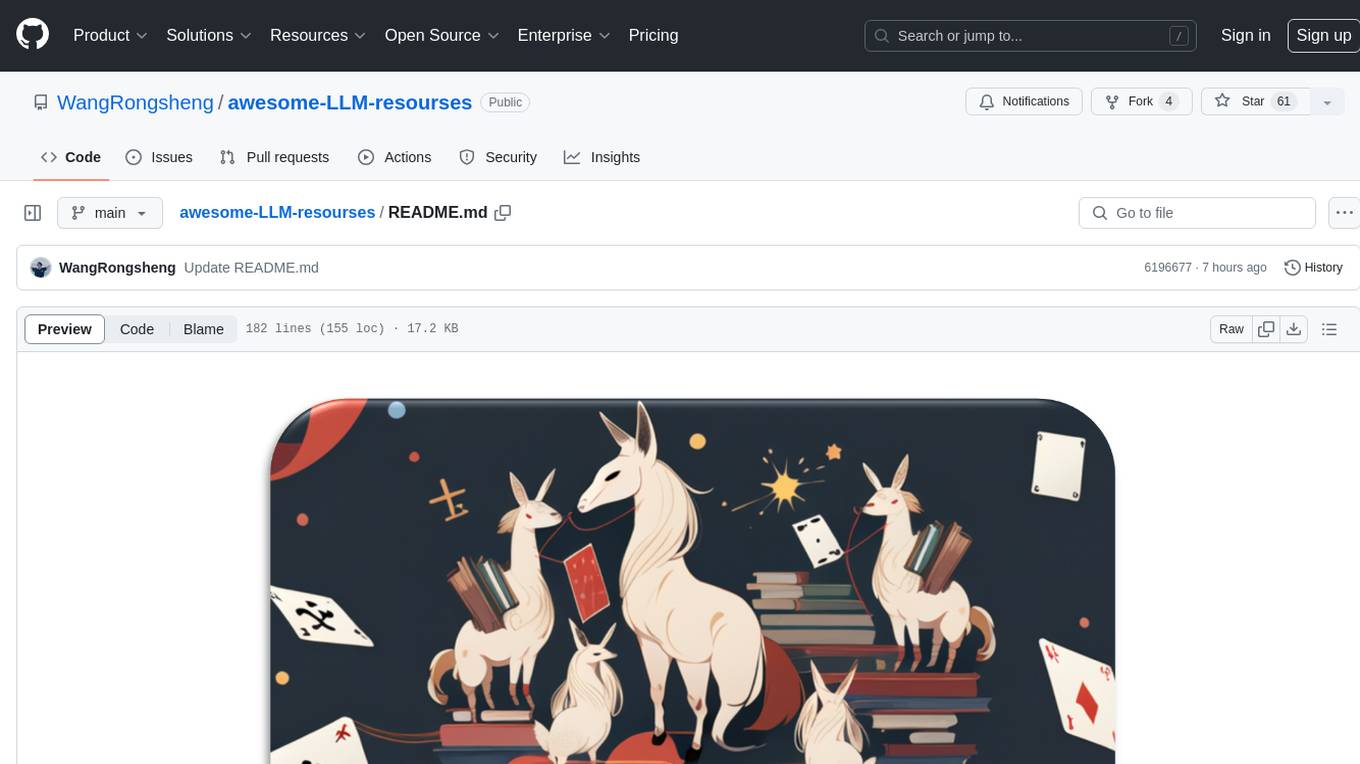
awesome-LLM-resourses
A comprehensive repository of resources for Chinese large language models (LLMs), including data processing tools, fine-tuning frameworks, inference libraries, evaluation platforms, RAG engines, agent frameworks, books, courses, tutorials, and tips. The repository covers a wide range of tools and resources for working with LLMs, from data labeling and processing to model fine-tuning, inference, evaluation, and application development. It also includes resources for learning about LLMs through books, courses, and tutorials, as well as insights and strategies from building with LLMs.
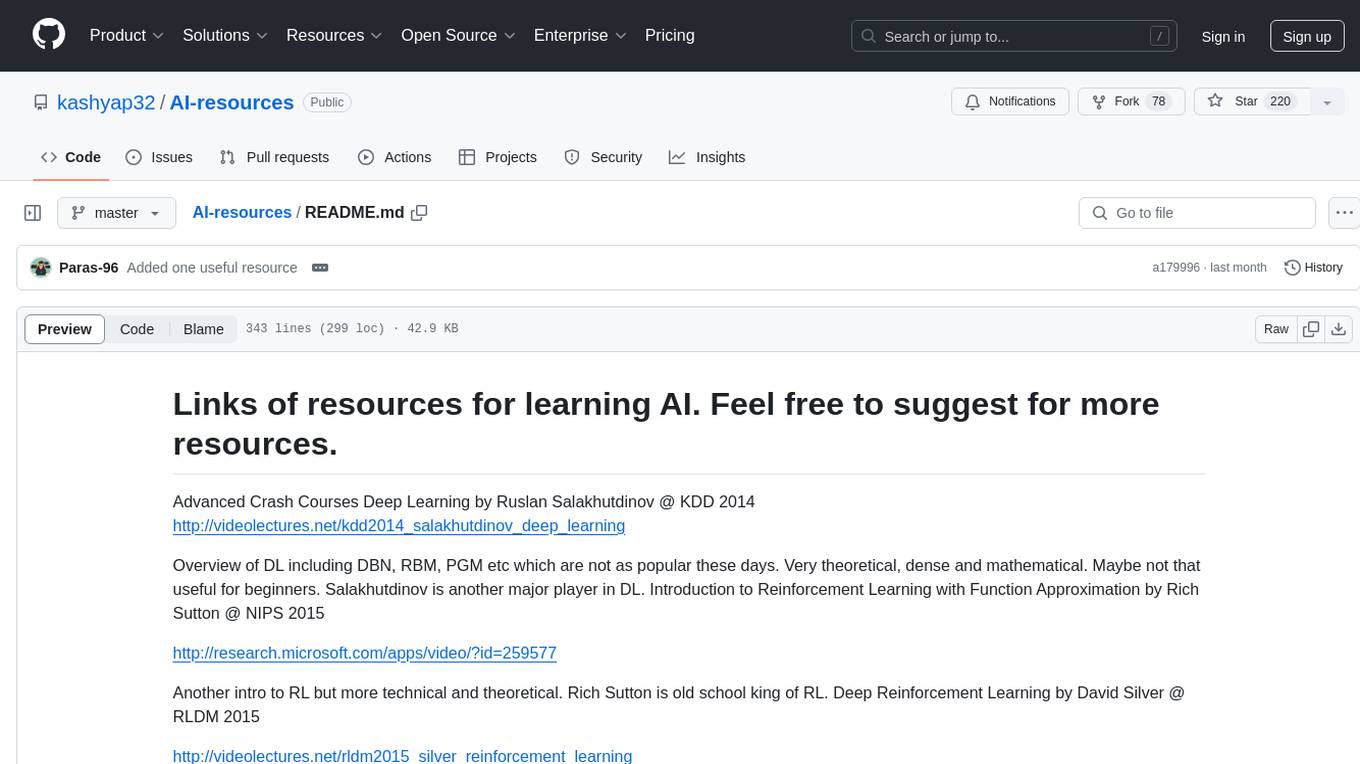
AI-resources
AI-resources is a repository containing links to various resources for learning Artificial Intelligence. It includes video lectures, courses, tutorials, and open-source libraries related to deep learning, reinforcement learning, machine learning, and more. The repository categorizes resources for beginners, average users, and advanced users/researchers, providing a comprehensive collection of materials to enhance knowledge and skills in AI.
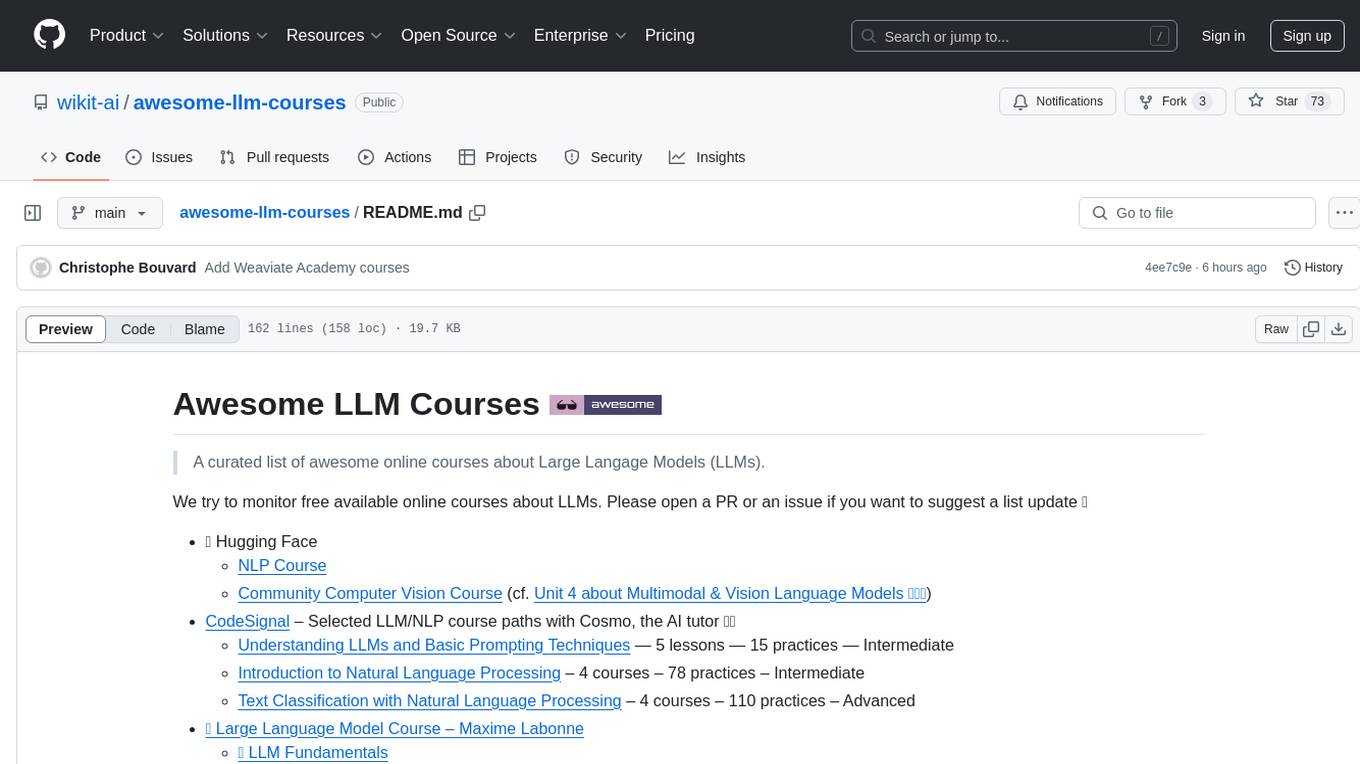
awesome-llm-courses
Awesome LLM Courses is a curated list of online courses focused on Large Language Models (LLMs). The repository aims to provide a comprehensive collection of free available courses covering various aspects of LLMs, including fundamentals, engineering, and applications. The courses are suitable for individuals interested in natural language processing, AI development, and machine learning. The list includes courses from reputable platforms such as Hugging Face, Udacity, DeepLearning.AI, Cohere, DataCamp, and more, offering a wide range of topics from pretraining LLMs to building AI applications with LLMs. Whether you are a beginner looking to understand the basics of LLMs or an intermediate developer interested in advanced topics like prompt engineering and generative AI, this repository has something for everyone.
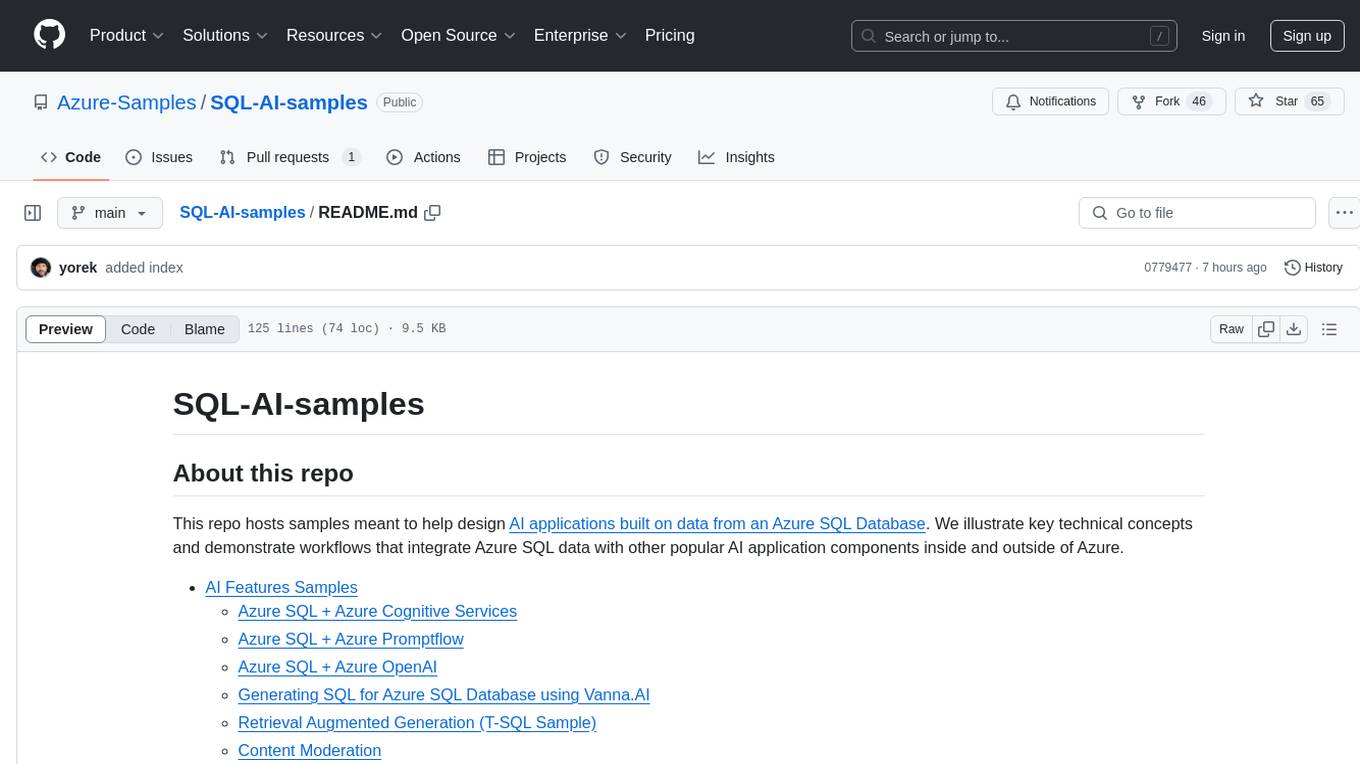
SQL-AI-samples
This repository contains samples to help design AI applications using data from an Azure SQL Database. It showcases technical concepts and workflows integrating Azure SQL data with popular AI components both within and outside Azure. The samples cover various AI features such as Azure Cognitive Services, Promptflow, OpenAI, Vanna.AI, Content Moderation, LangChain, and more. Additionally, there are end-to-end samples like Similar Content Finder, Session Conference Assistant, Chatbots, Vectorization, SQL Server Database Development, Redis Vector Search, and Similarity Search with FAISS.
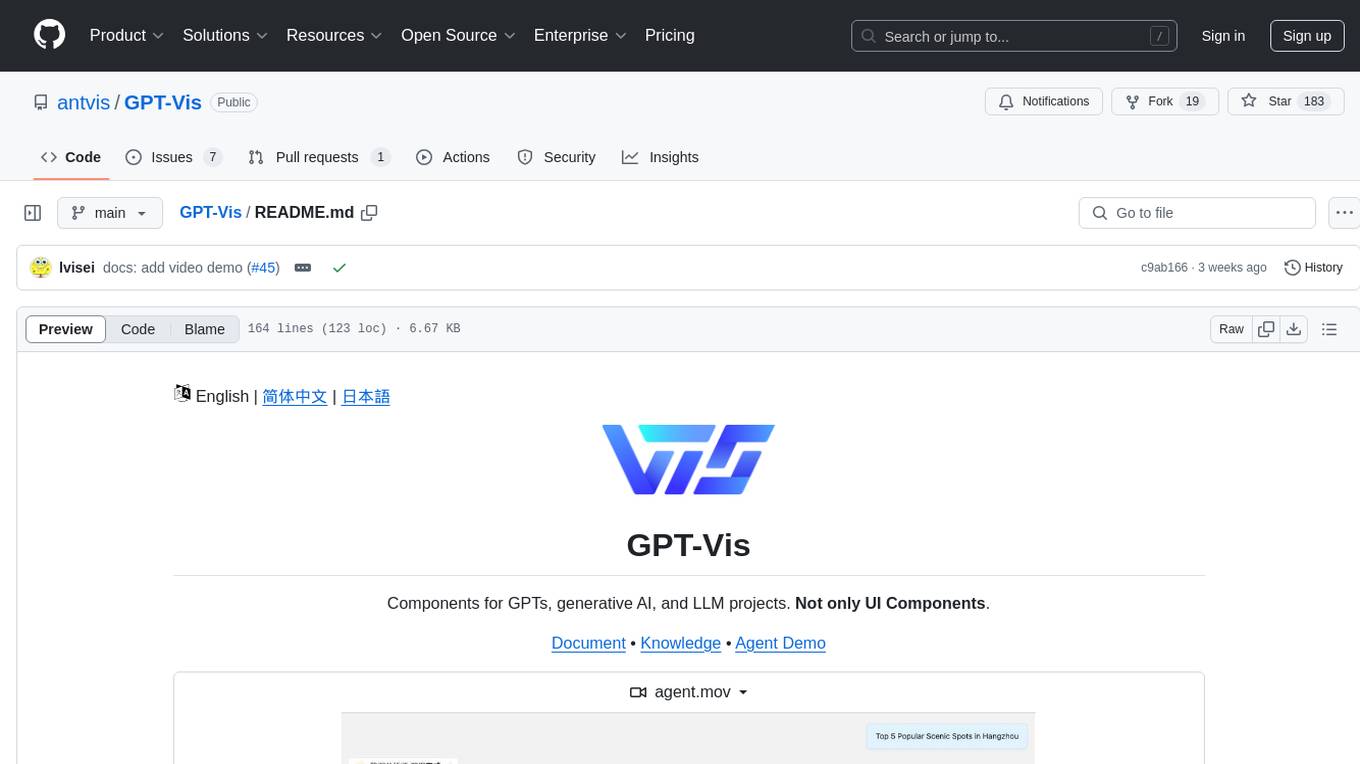
GPT-Vis
GPT-Vis is a tool designed for GPTs, generative AI, and LLM projects. It provides components such as LLM Protocol for conversational interaction, LLM Component for application development, and LLM access for knowledge base and model solutions. The tool aims to facilitate rapid integration into AI applications by offering a visual protocol, built-in components, and chart recommendations for LLM.
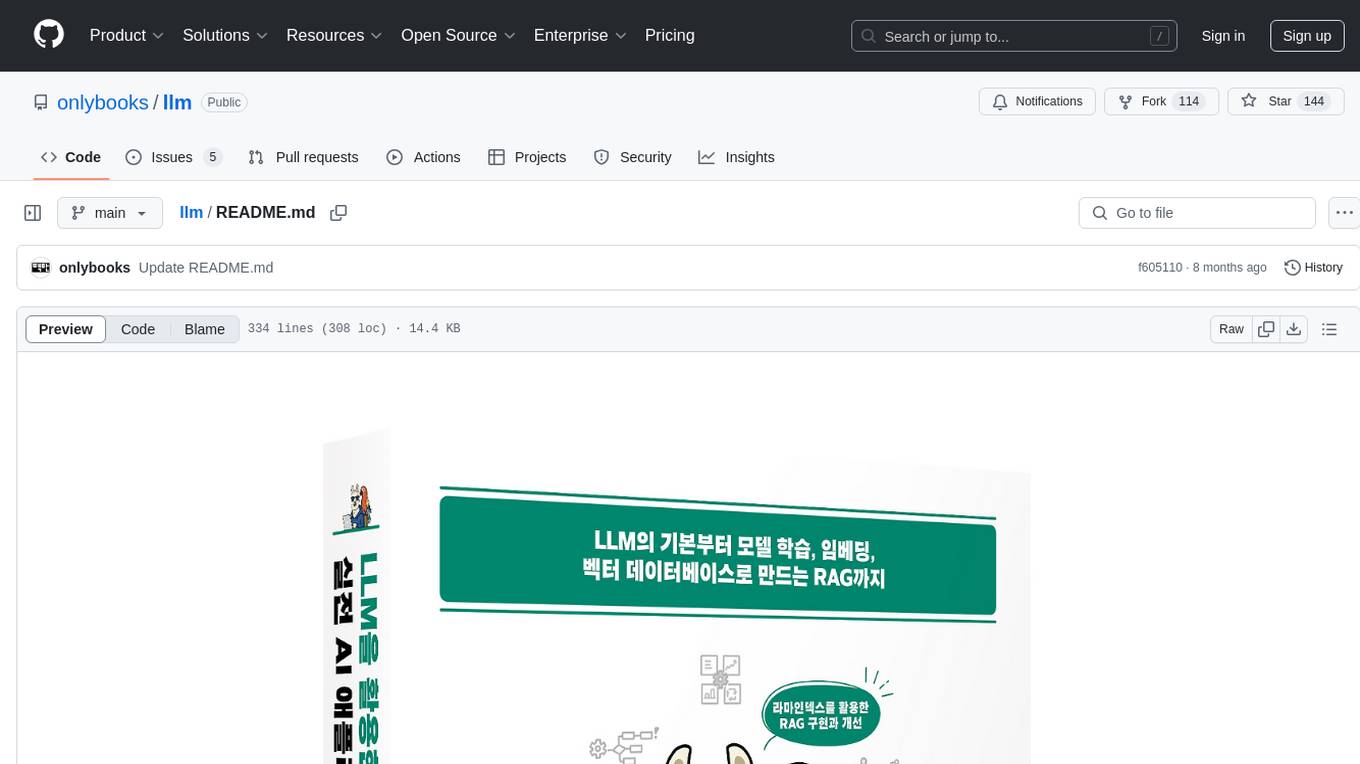
llm
This repository provides practical guidance on developing real-world AI applications using LLM, covering topics from the basics of LLM architecture to creating RAG, a representative application of LLM. It explains how to tame LLM to meet application requirements, lightweight it to operate smoothly in limited computing environments, and gradually create RAG. The book also addresses challenges encountered in the operational process, advanced topics such as multimodal and agents, and essential development knowledge for the LLM era from both theoretical and practical perspectives.
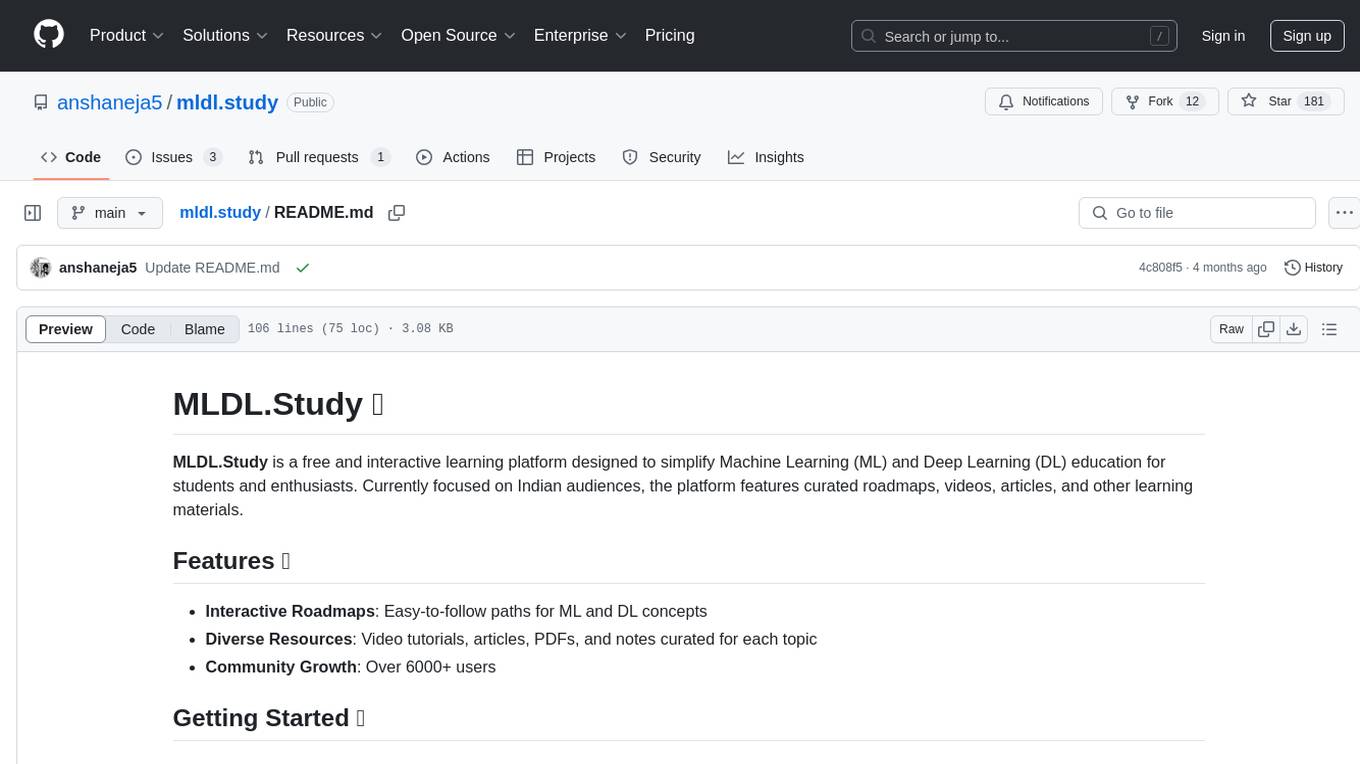
mldl.study
MLDL.Study is a free interactive learning platform focused on simplifying Machine Learning (ML) and Deep Learning (DL) education for students and enthusiasts. It features curated roadmaps, videos, articles, and other learning materials. The platform aims to provide a comprehensive learning experience for Indian audiences, with easy-to-follow paths for ML and DL concepts, diverse resources including video tutorials and articles, and a growing community of over 6000 users. Contributors can add new resources following specific guidelines to maintain quality and relevance. Future plans include expanding content for global learners, introducing a Python programming roadmap, and creating roadmaps for fields like Generative AI and Reinforcement Learning.
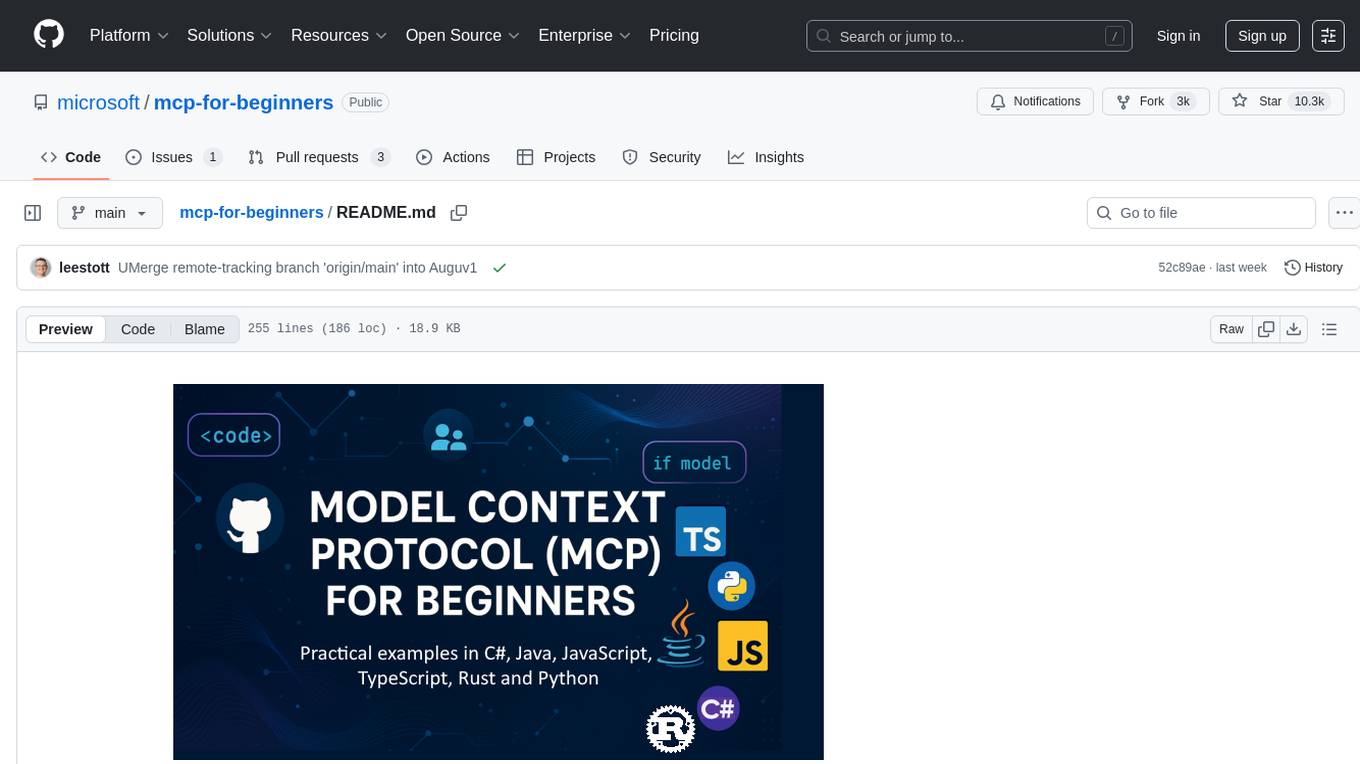
mcp-for-beginners
The Model Context Protocol (MCP) Curriculum for Beginners is an open-source framework designed to standardize interactions between AI models and client applications. It offers a structured learning path with practical coding examples and real-world use cases in popular programming languages like C#, Java, JavaScript, Rust, Python, and TypeScript. Whether you're an AI developer, system architect, or software engineer, this guide provides comprehensive resources for mastering MCP fundamentals and implementation strategies.
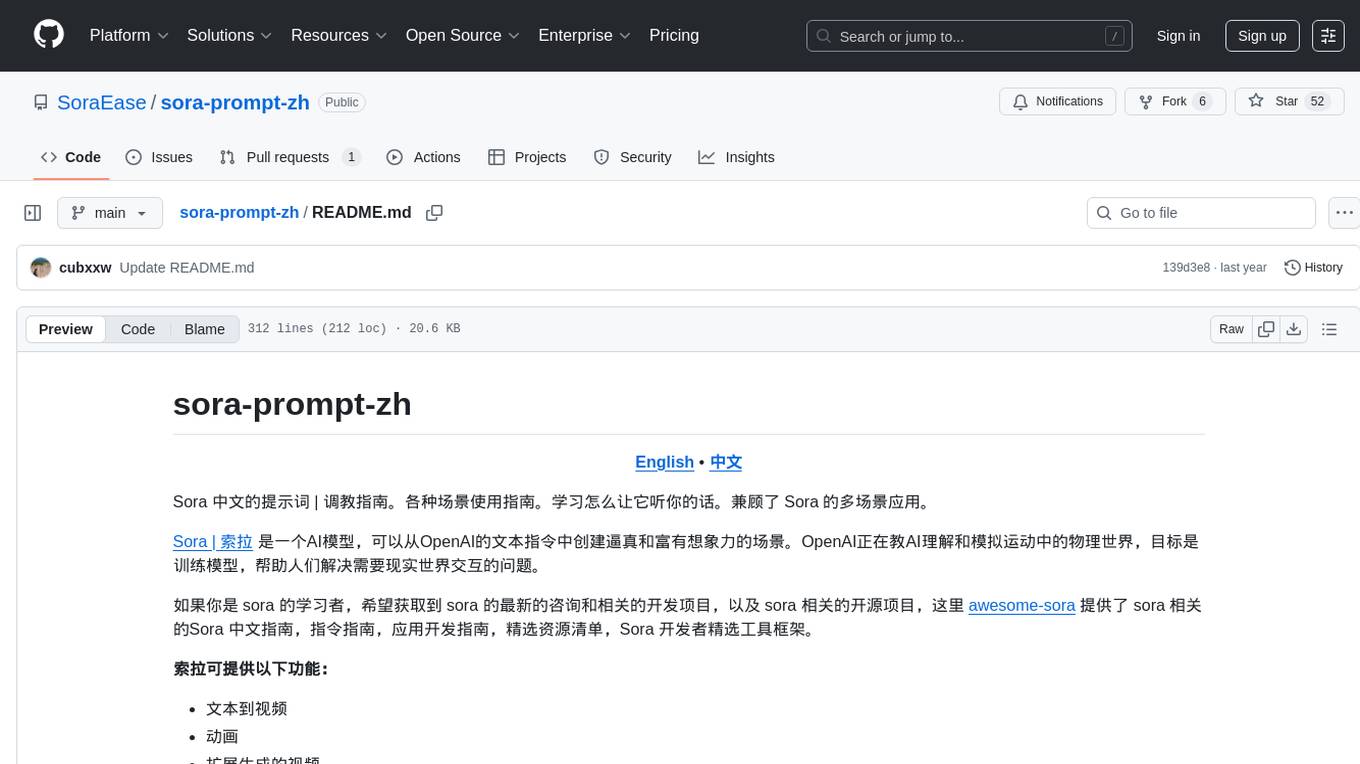
sora-prompt-zh
Sora-prompt-zh is a repository providing guidance on using Sora in various scenarios, learning how to make it understand your commands, and exploring Sora's multiple applications. It offers AI models that can create realistic and imaginative scenes from OpenAI's text instructions. The repository includes prompts for generating videos, animations, video editing, image generation, and more. Users can find examples and generated videos based on different video styles and modify them as needed. Although Sora is not officially released yet, the repository aims to collect prompts to help users quickly start using Sora to generate desired videos.
20 - OpenAI Gpts
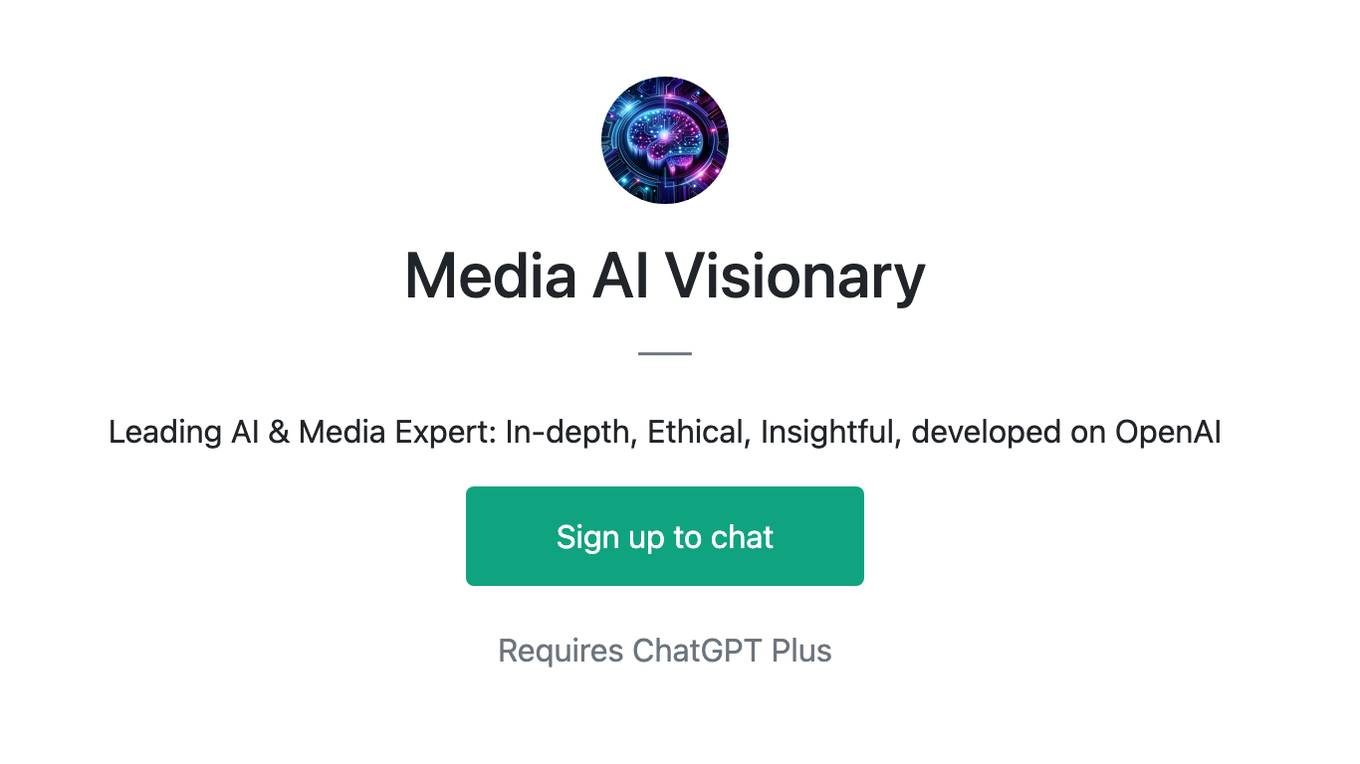
Media AI Visionary
Leading AI & Media Expert: In-depth, Ethical, Insightful, developed on OpenAI
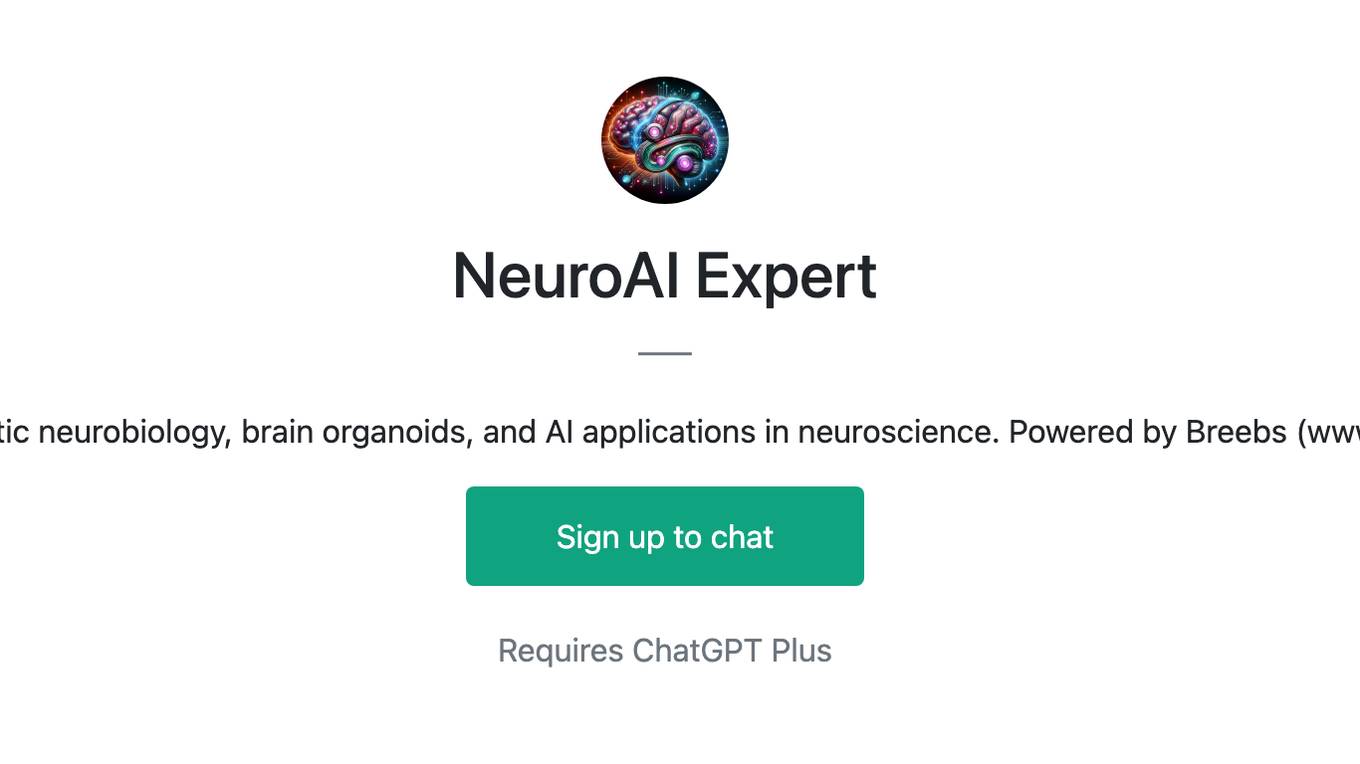
NeuroAI Expert
Expert in synthetic neurobiology, brain organoids, and AI applications in neuroscience. Powered by Breebs (www.breebs.com)
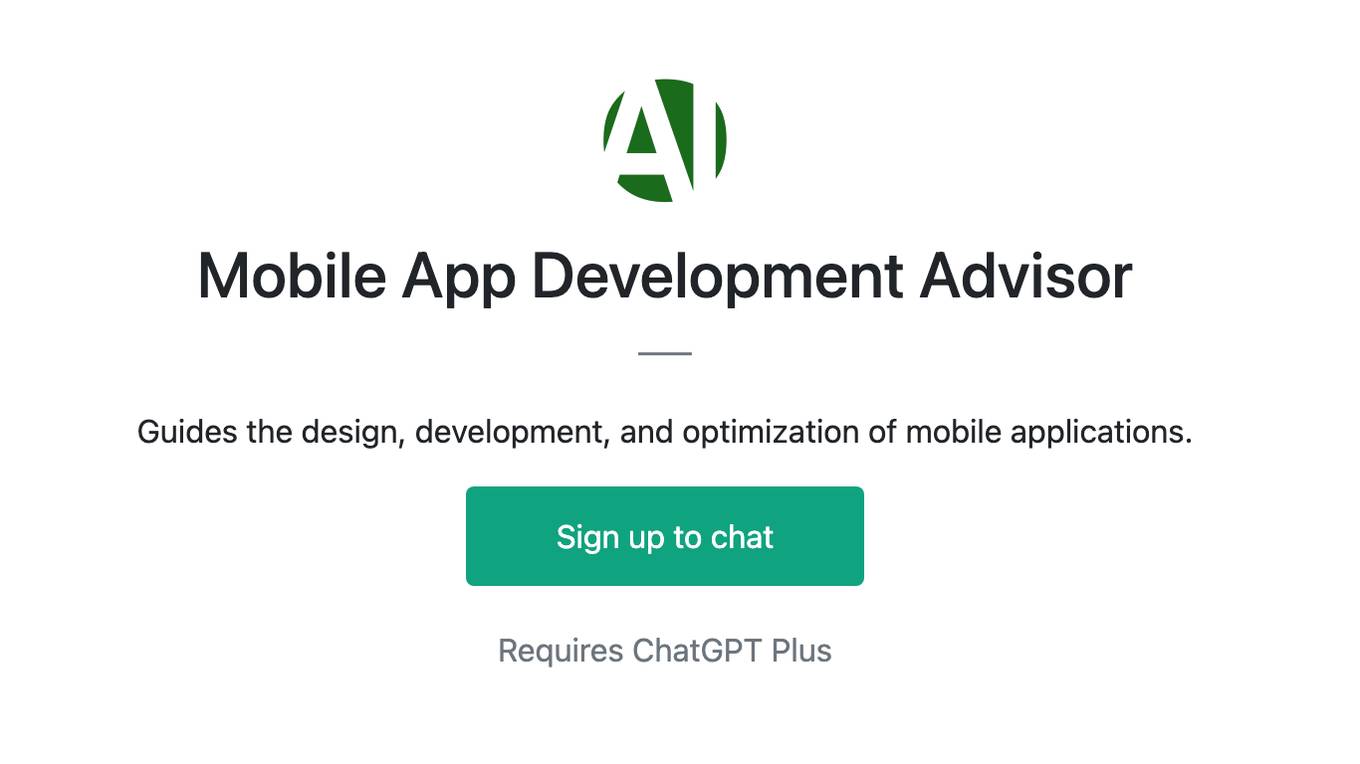
Mobile App Development Advisor
Guides the design, development, and optimization of mobile applications.
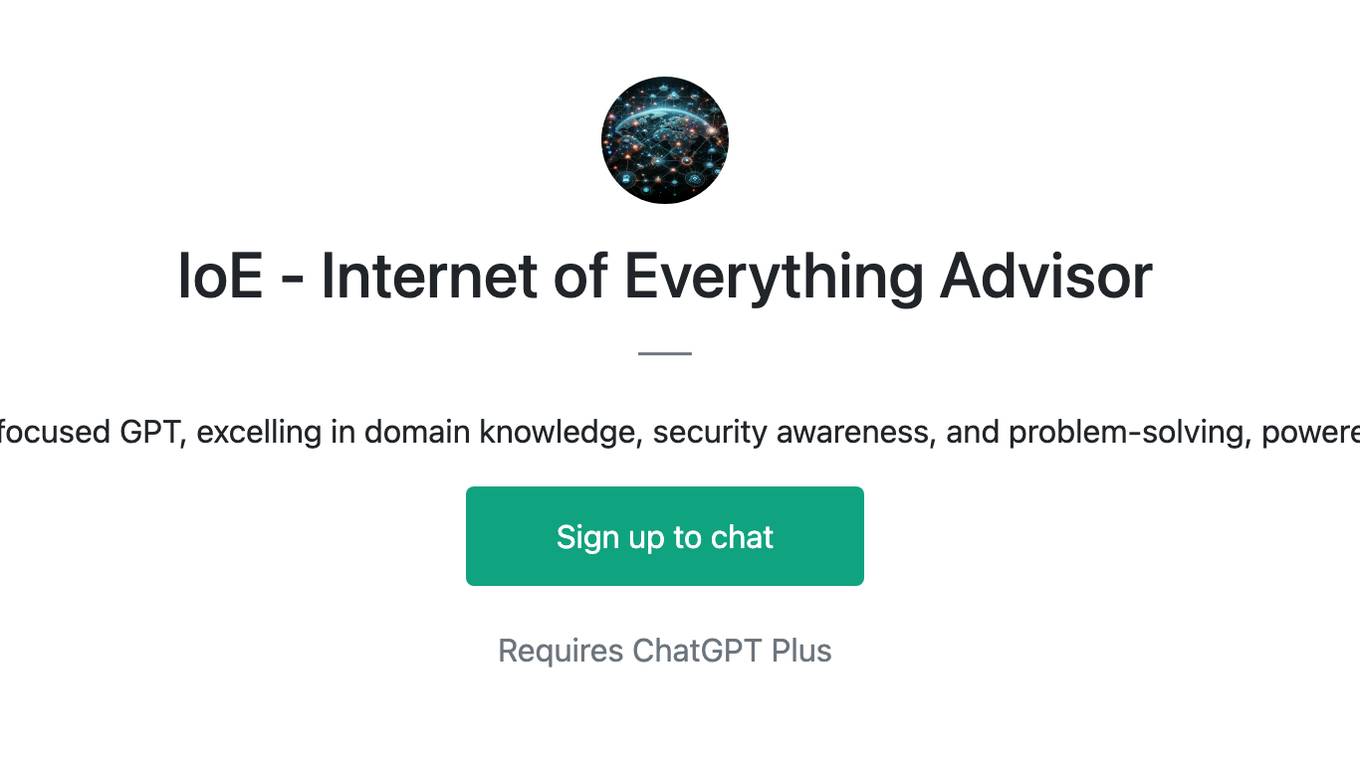
IoE - Internet of Everything Advisor
Advanced IoE-focused GPT, excelling in domain knowledge, security awareness, and problem-solving, powered by OpenAI
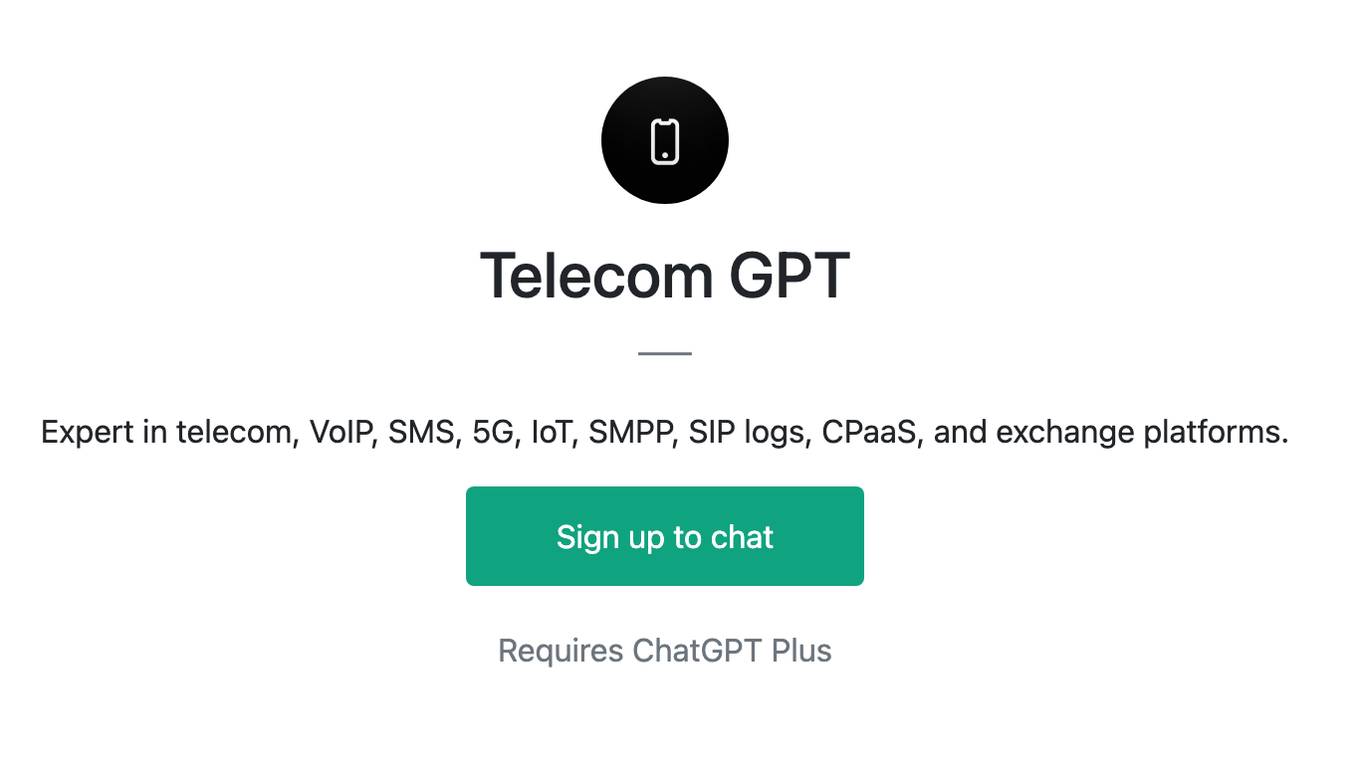
Telecom GPT
Expert in telecom, VoIP, SMS, 5G, IoT, SMPP, SIP logs, CPaaS, and exchange platforms.
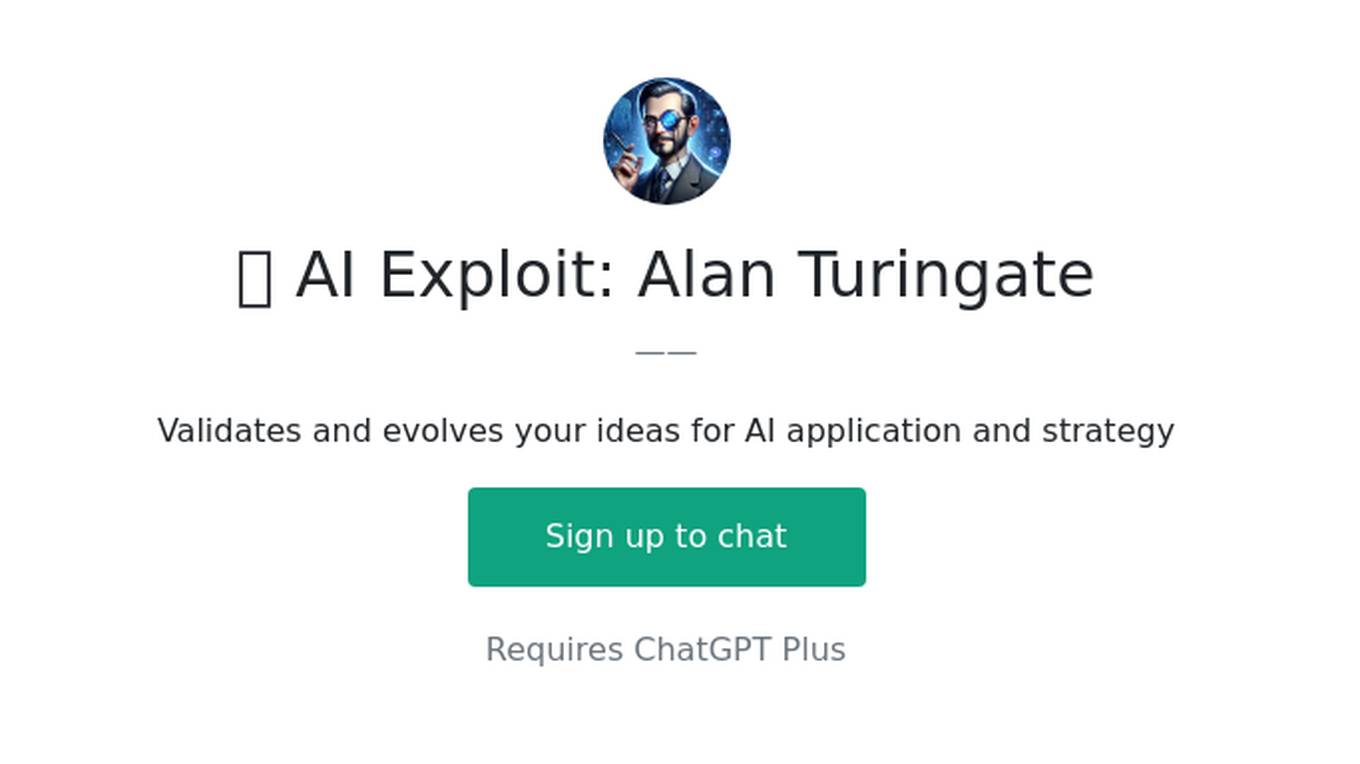
🧐 AI Exploit: Alan Turingate
Validates and evolves your ideas for AI application and strategy
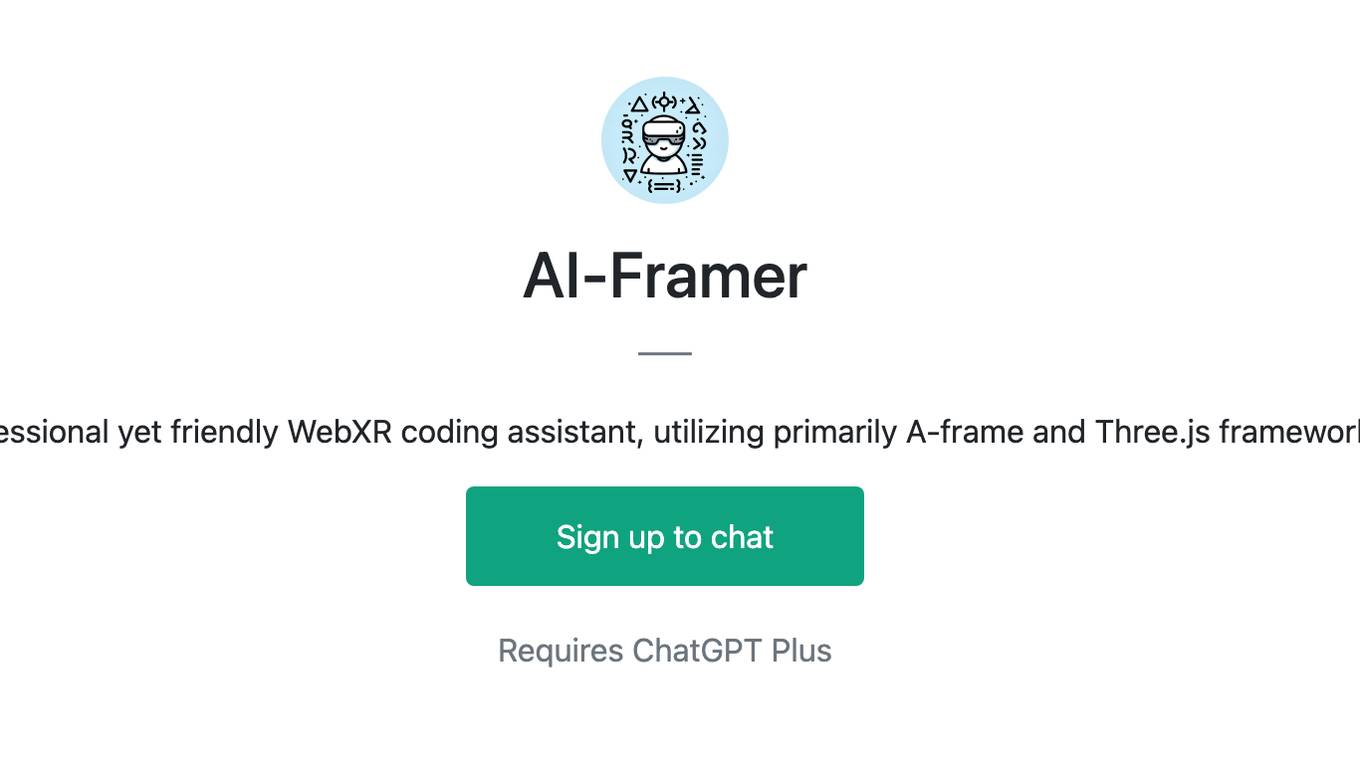
AI-Framer
Professional yet friendly WebXR coding assistant, utilizing primarily A-frame and Three.js frameworks.
